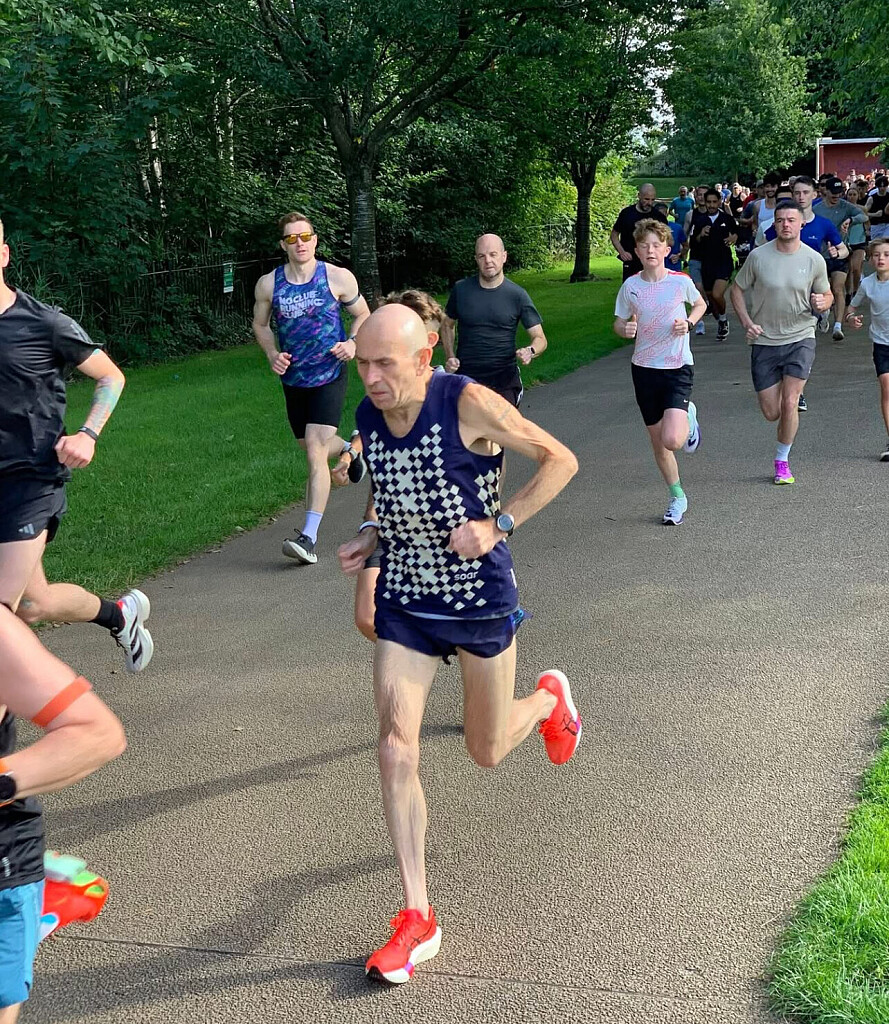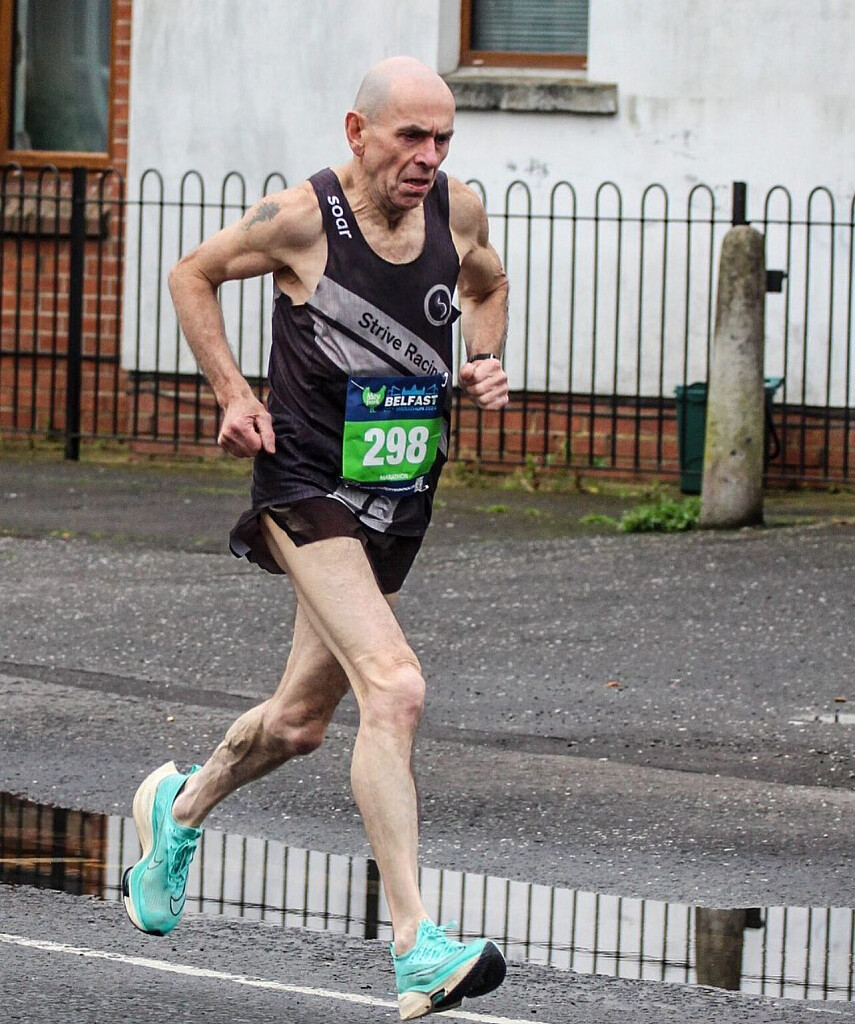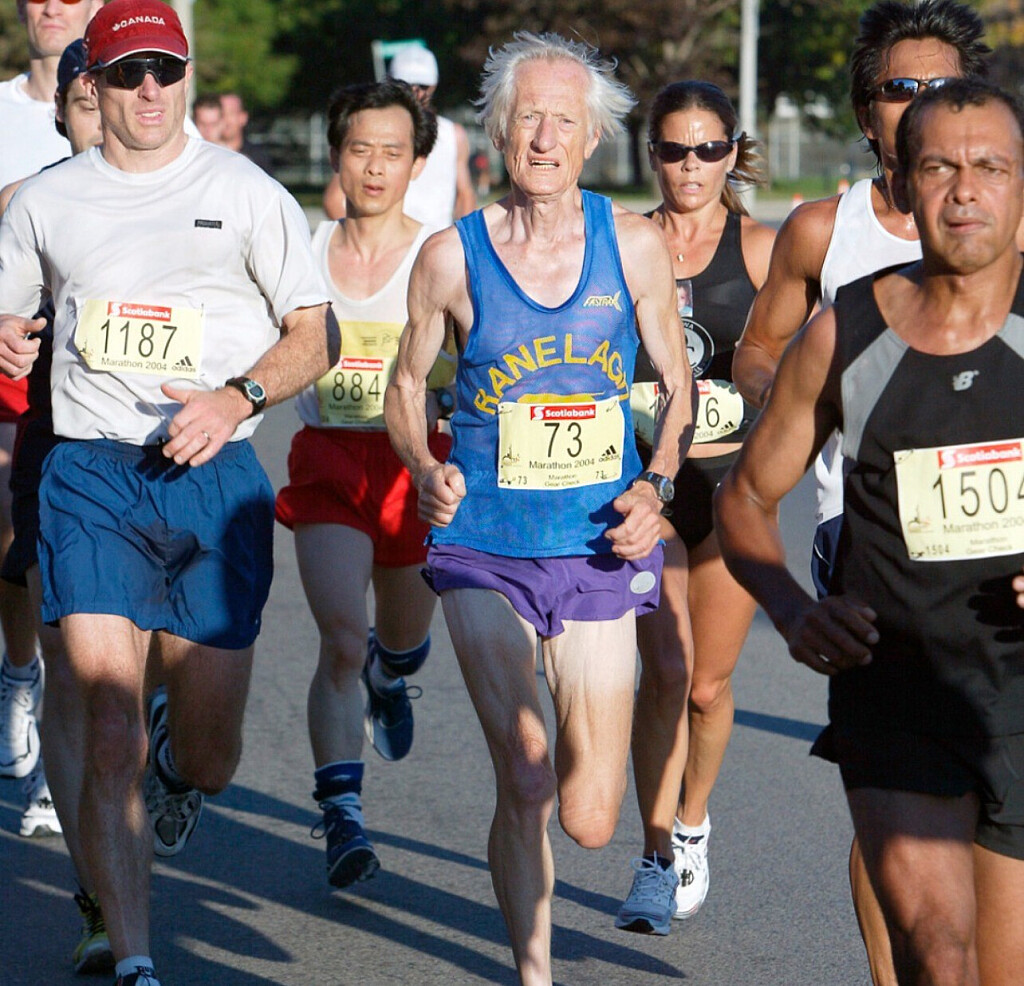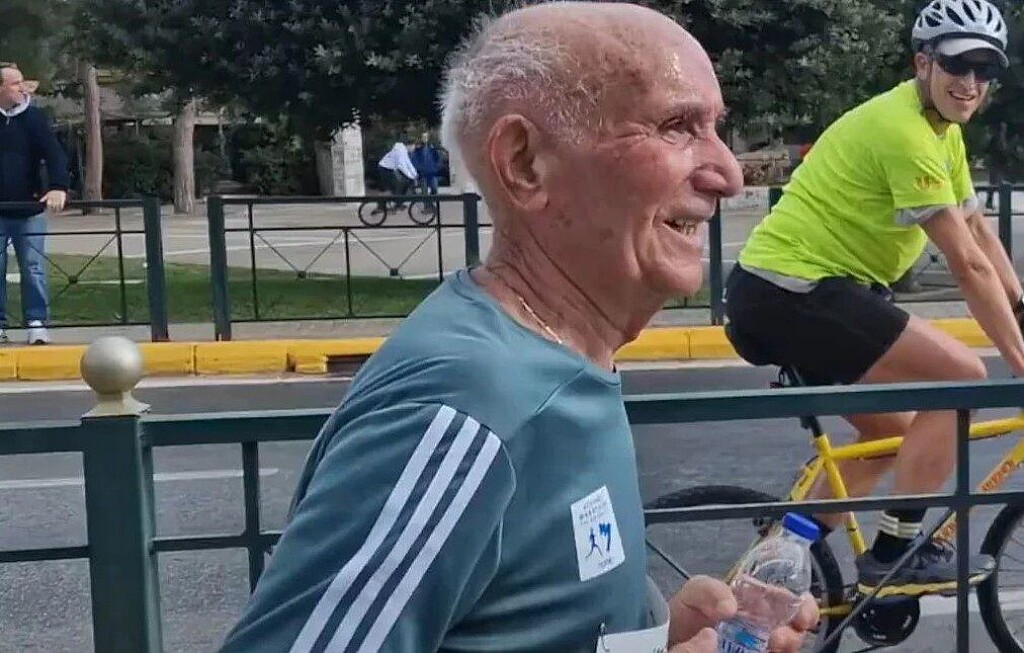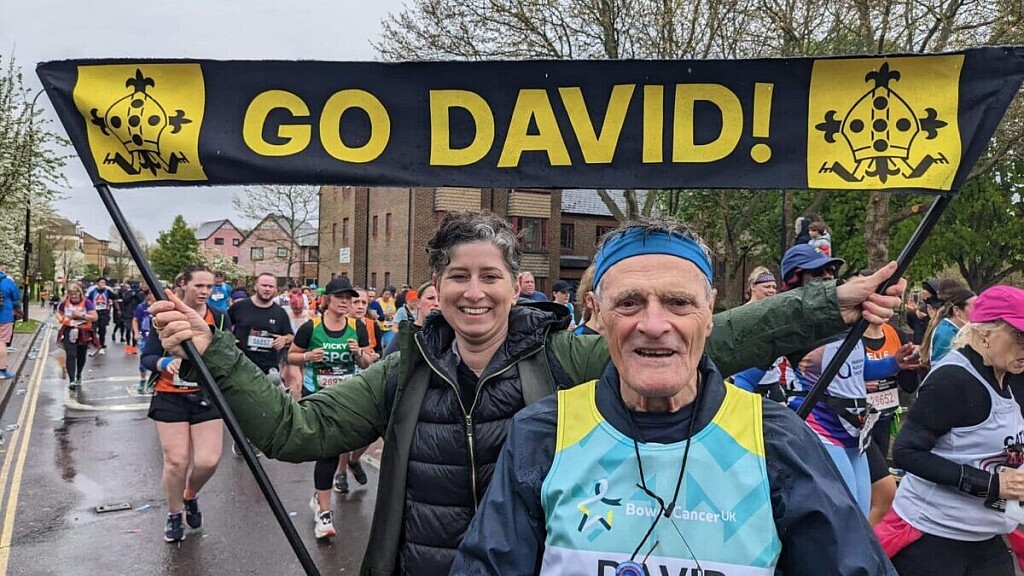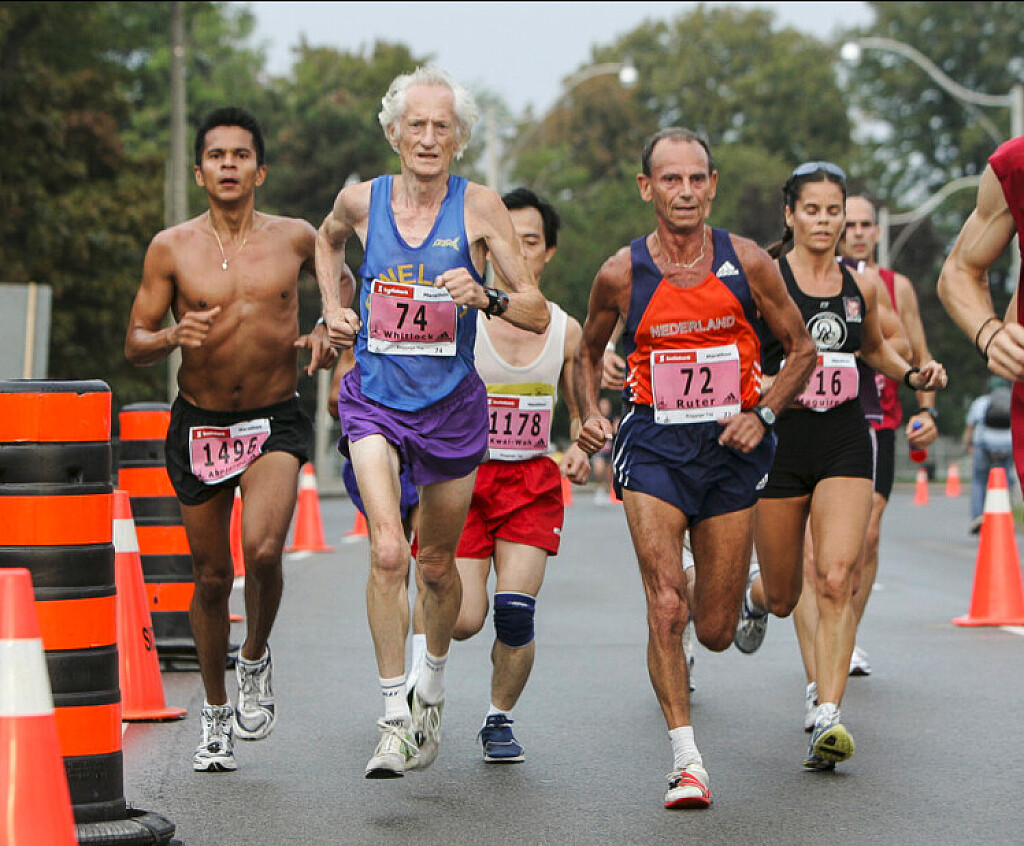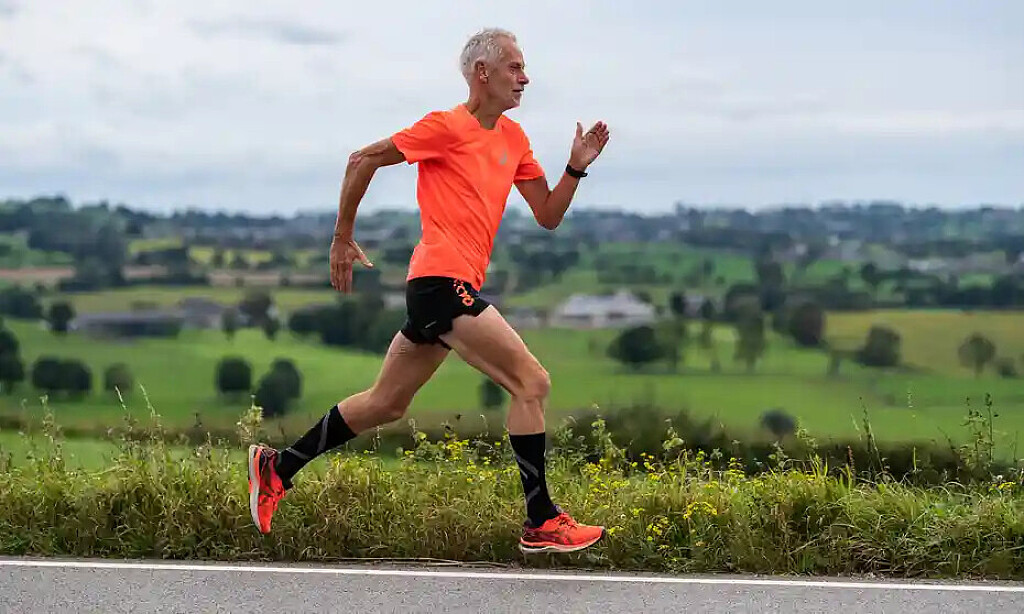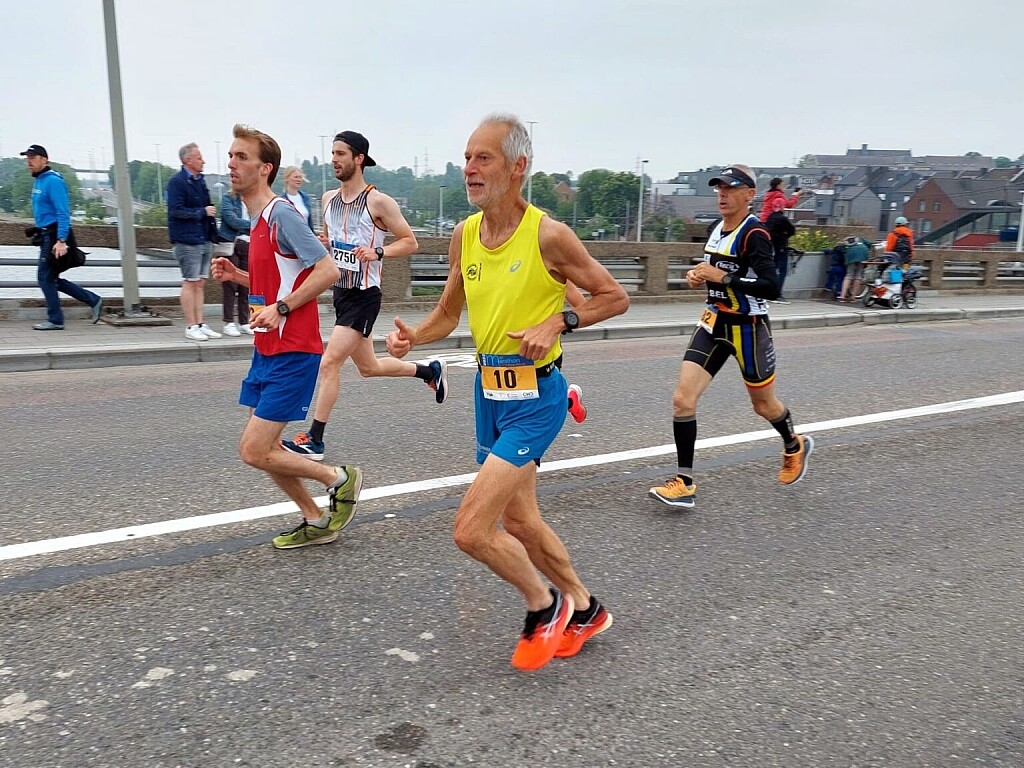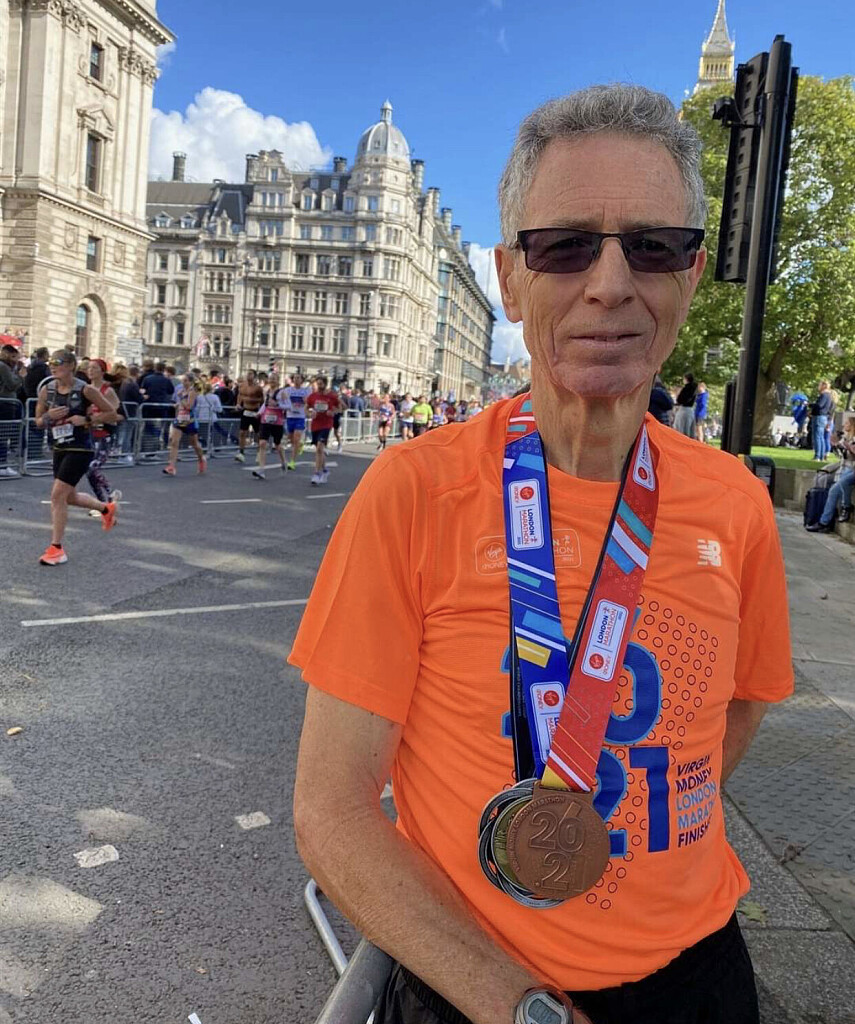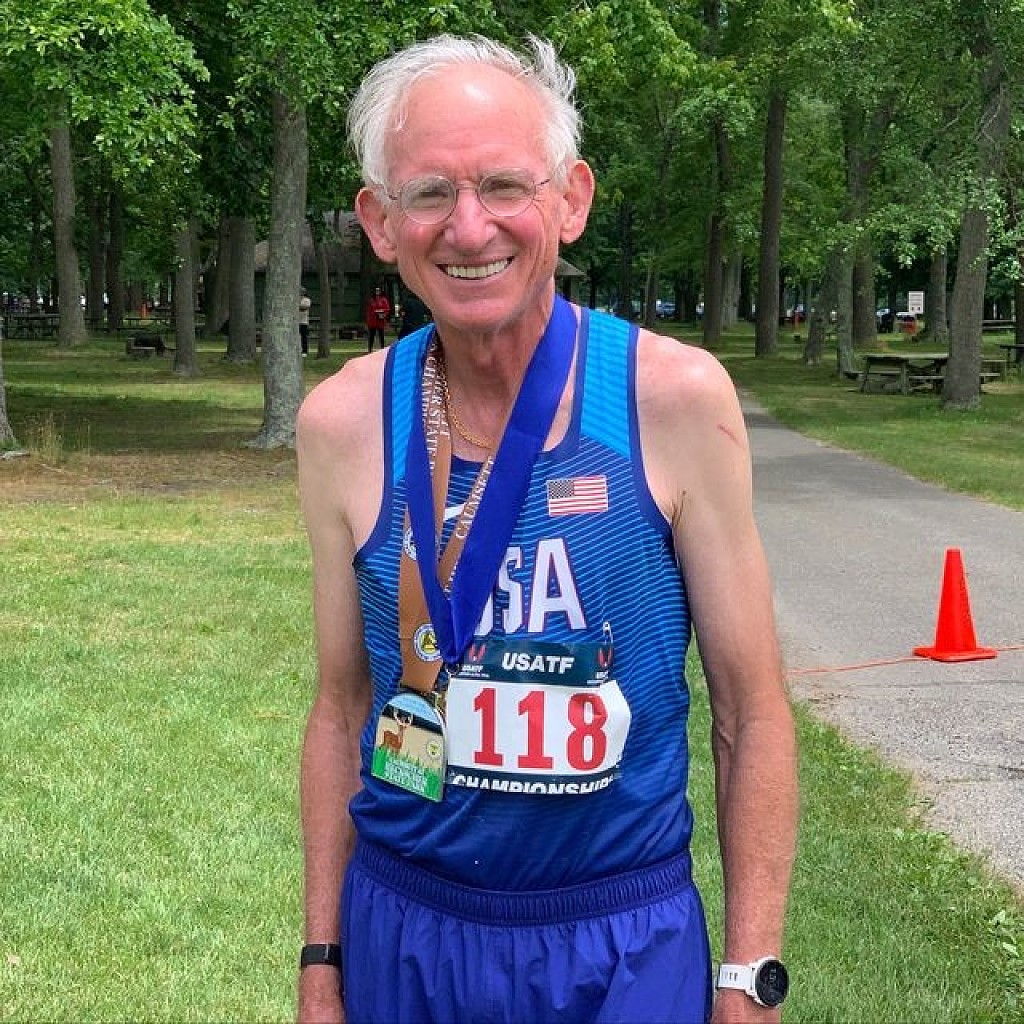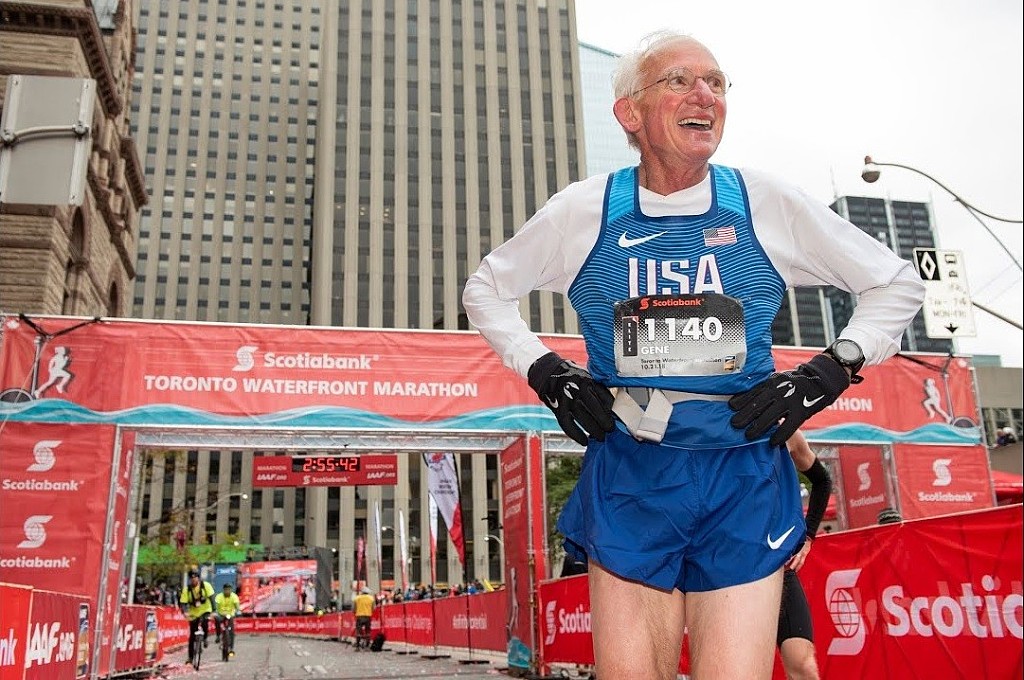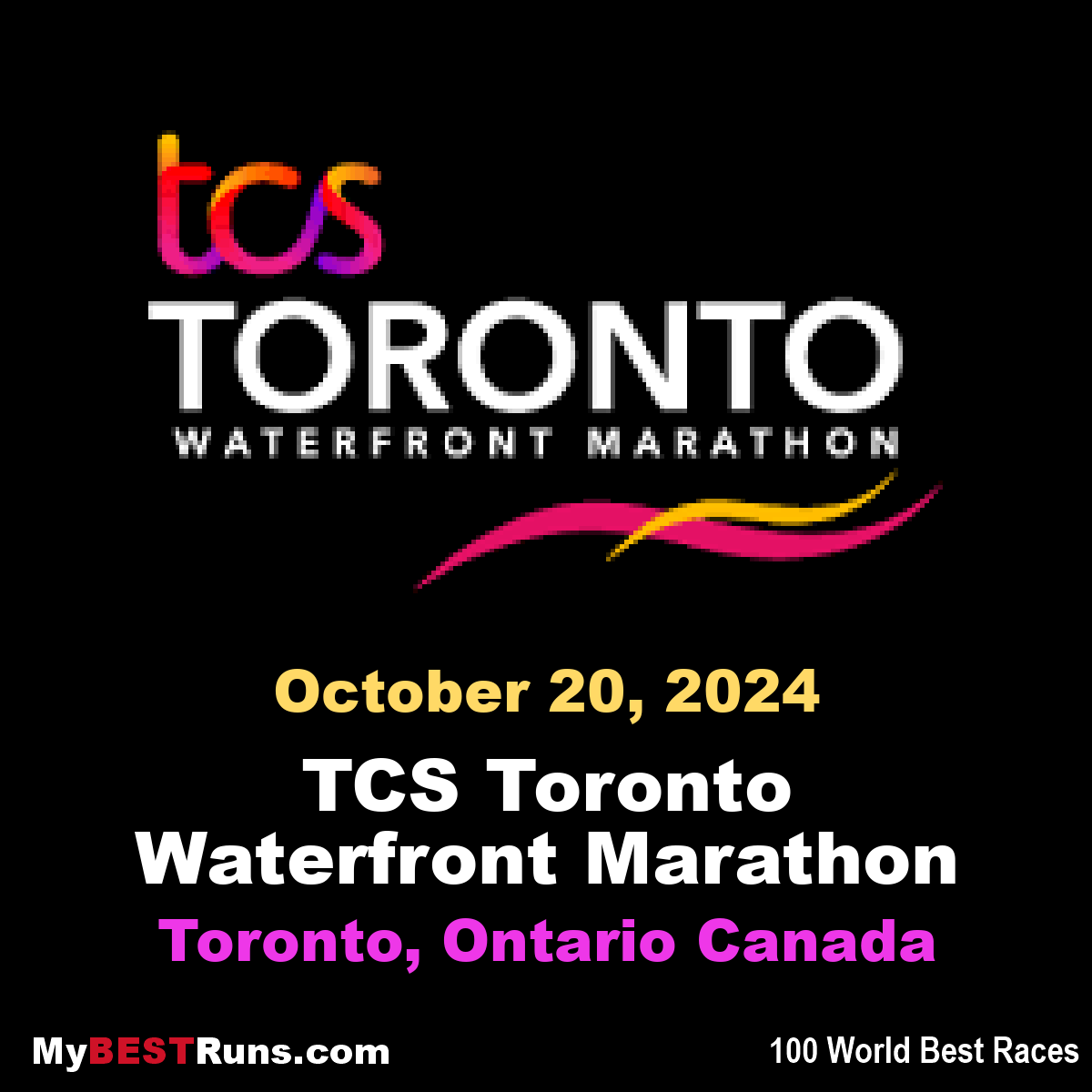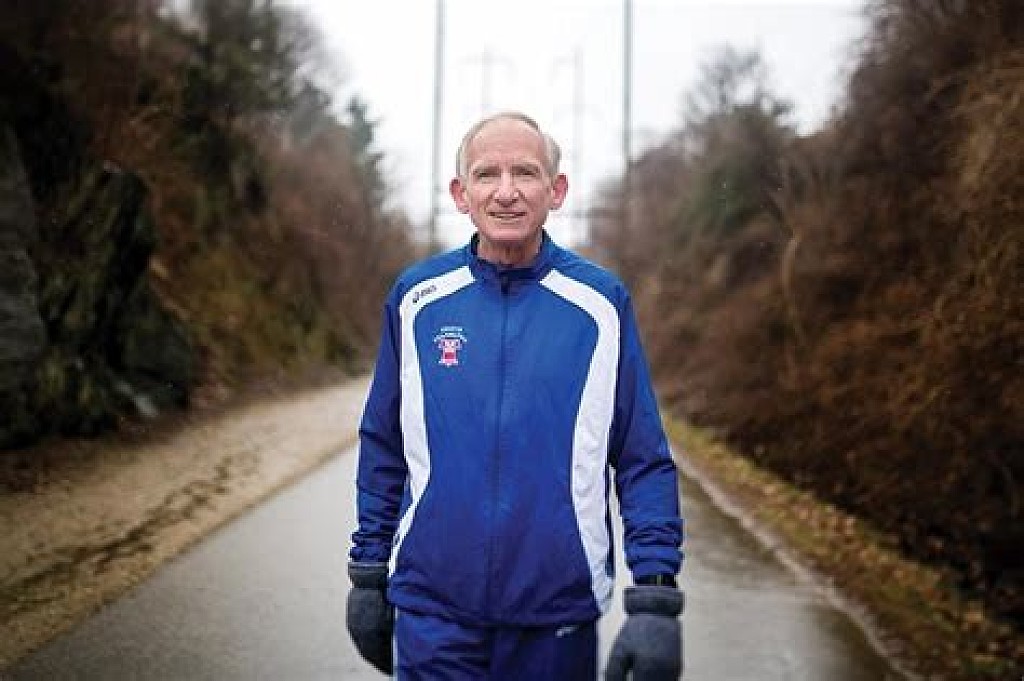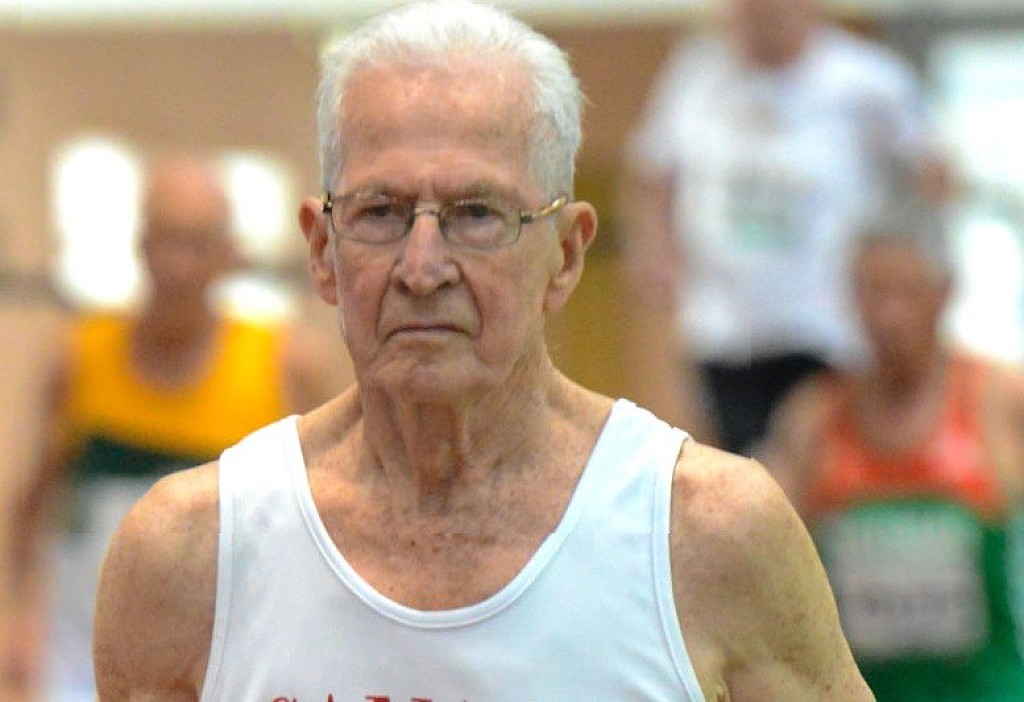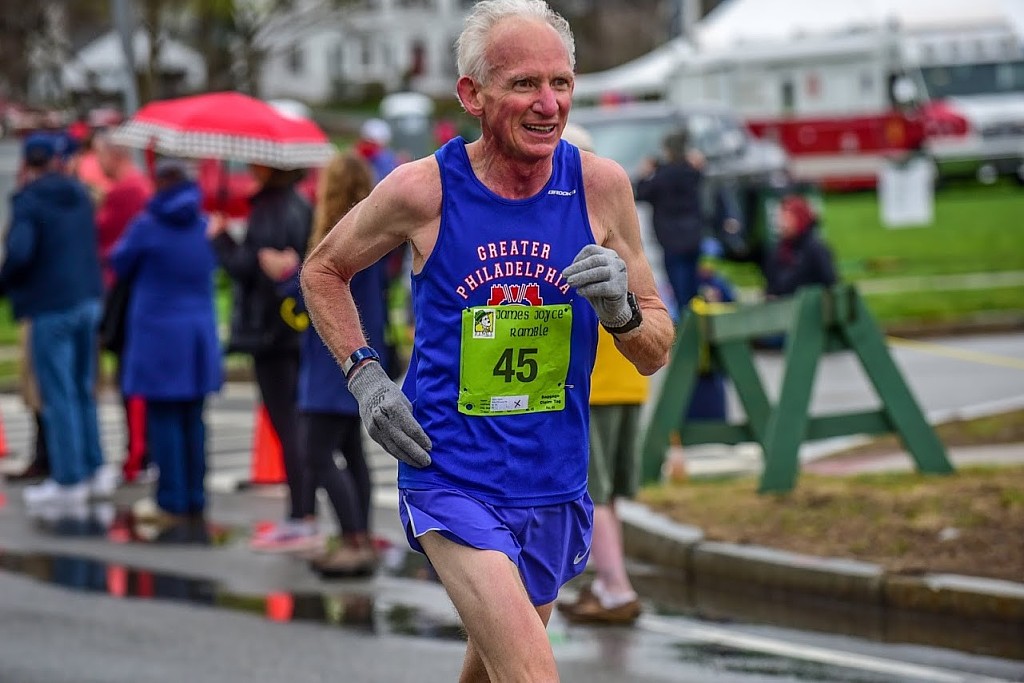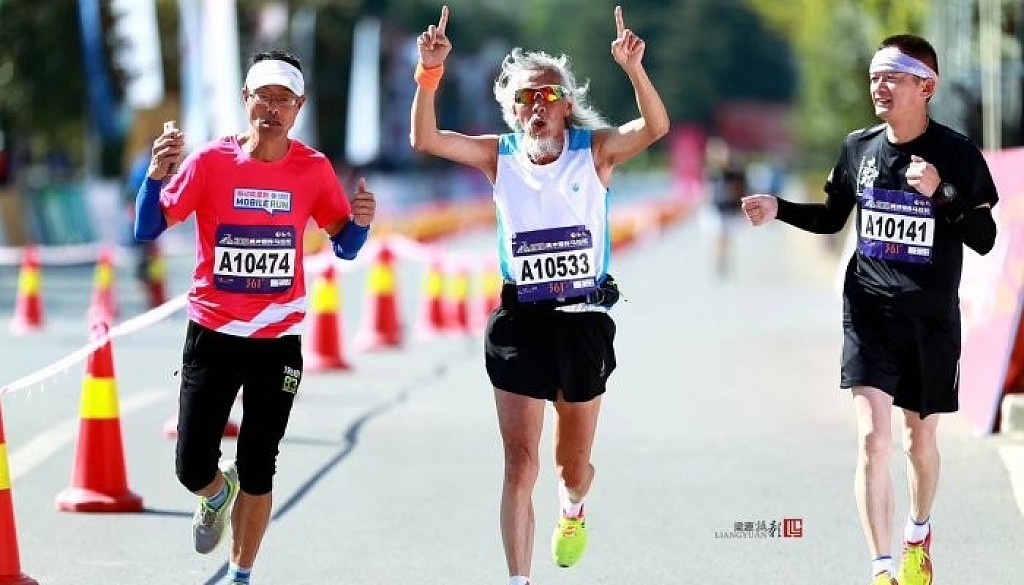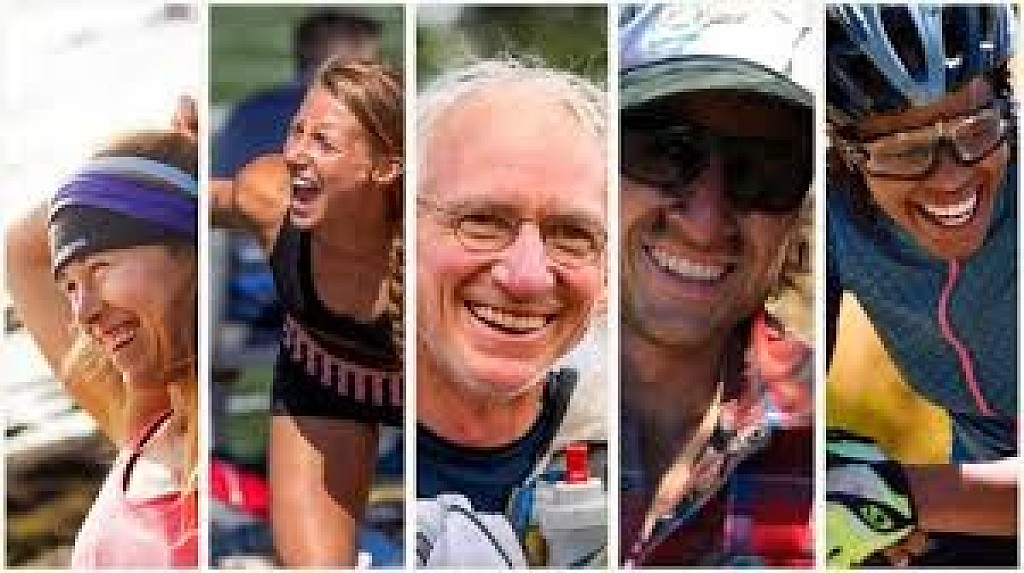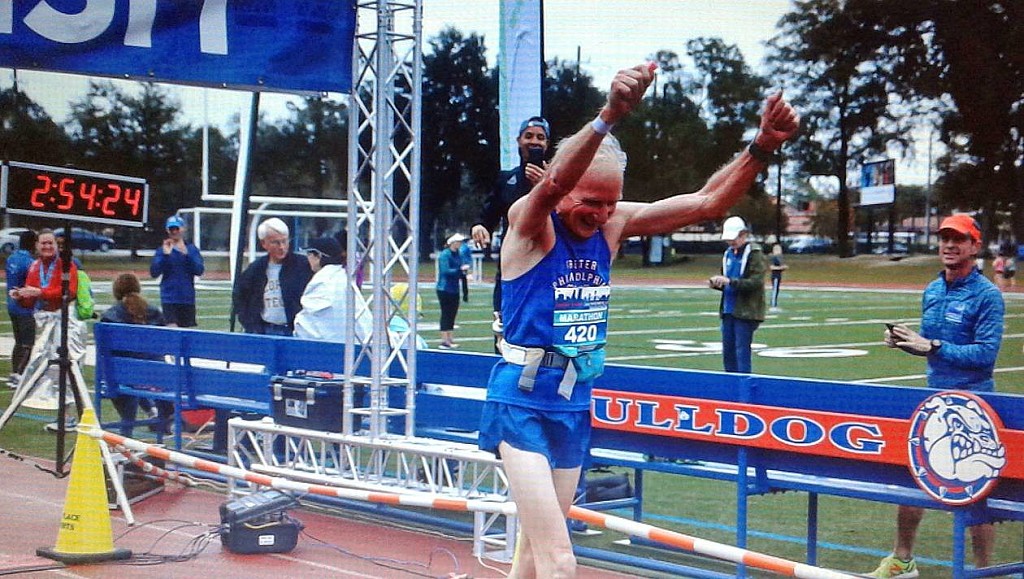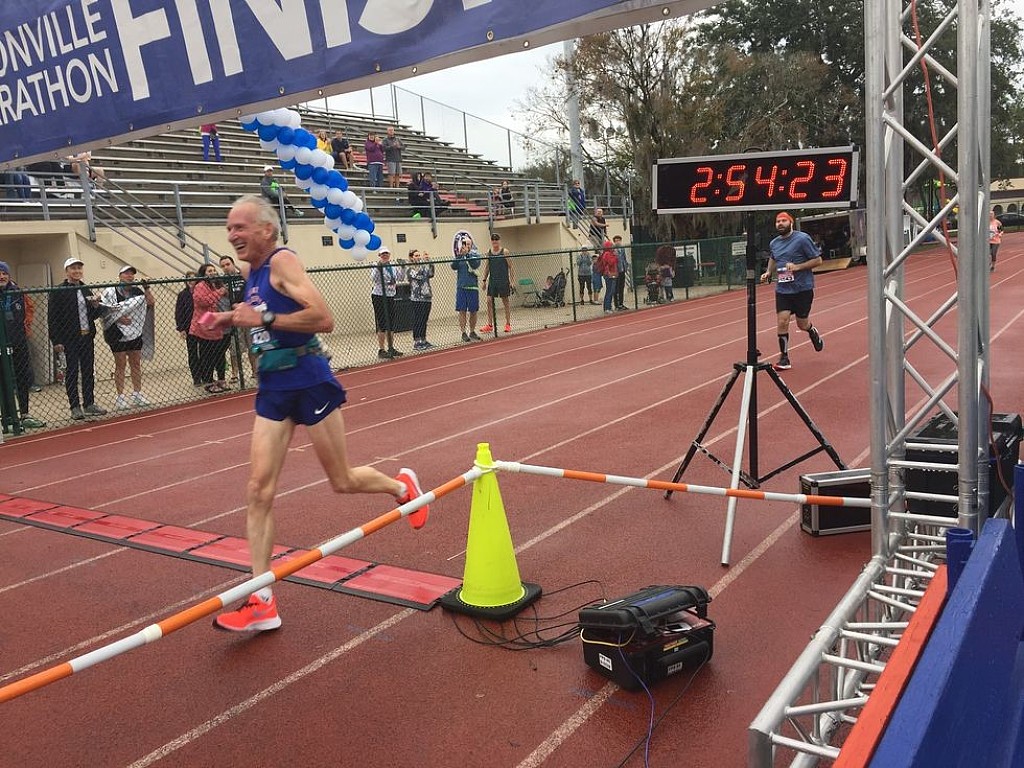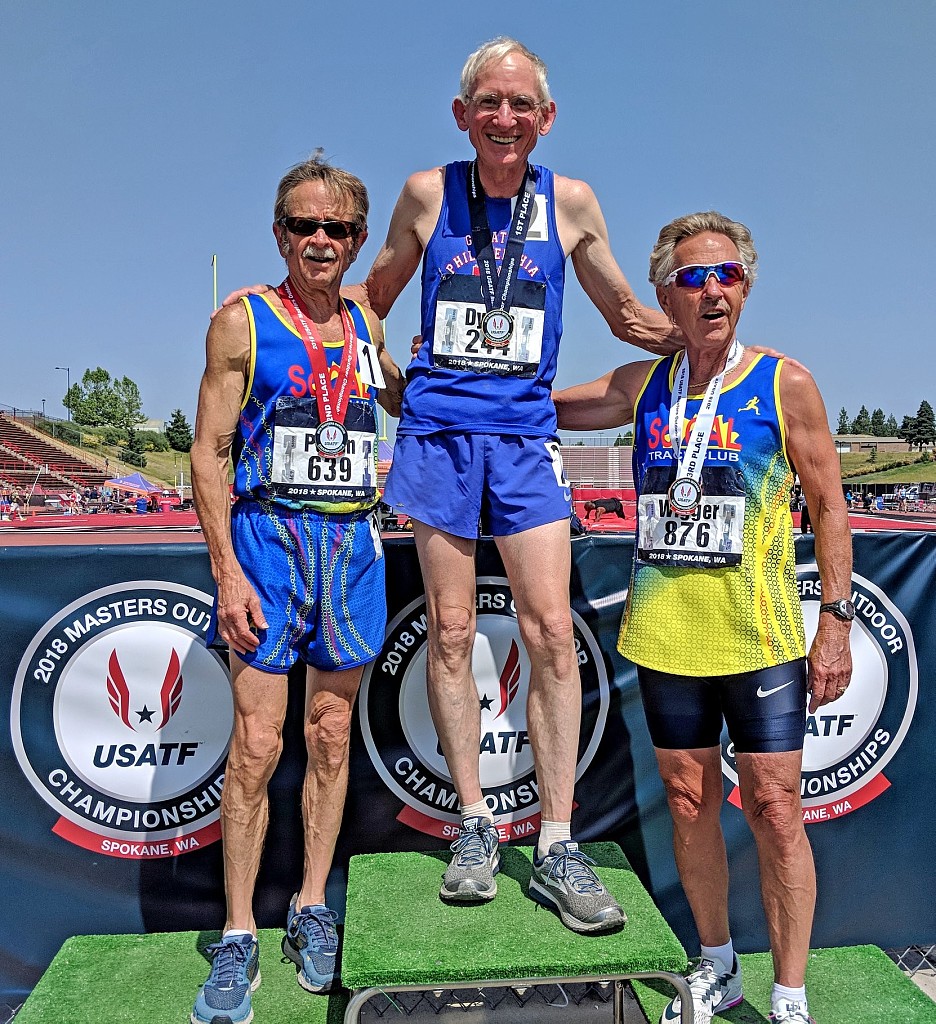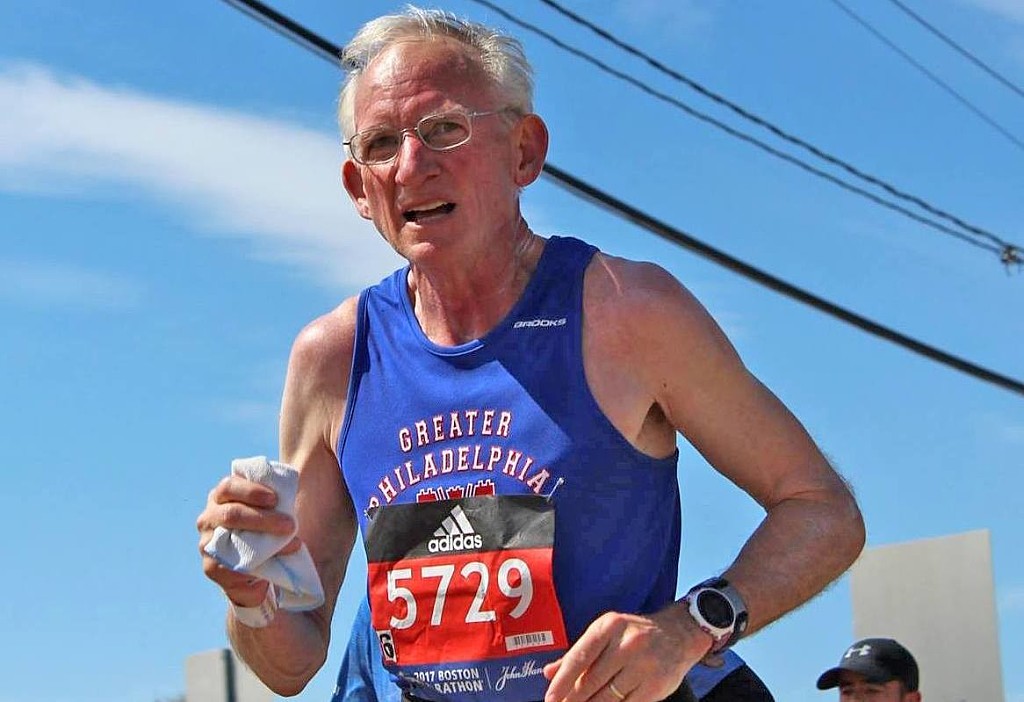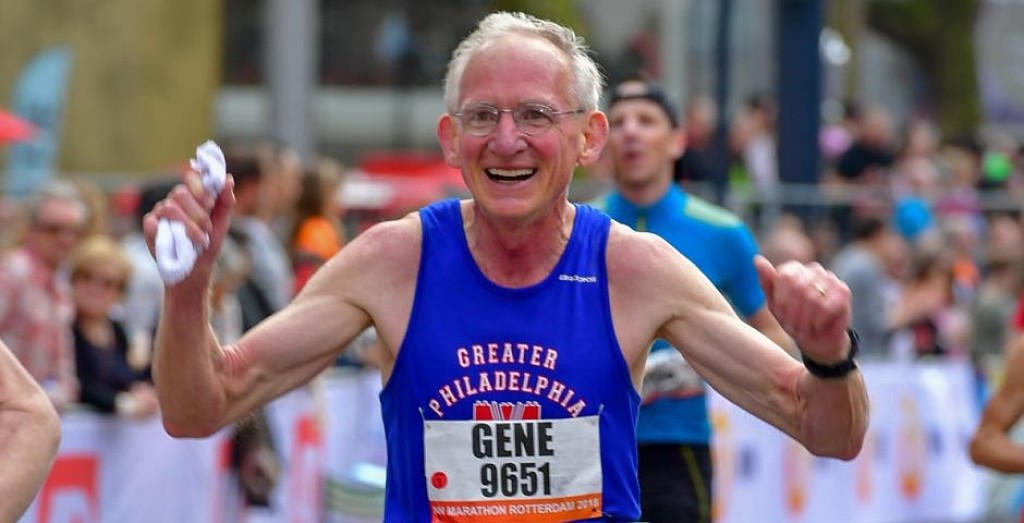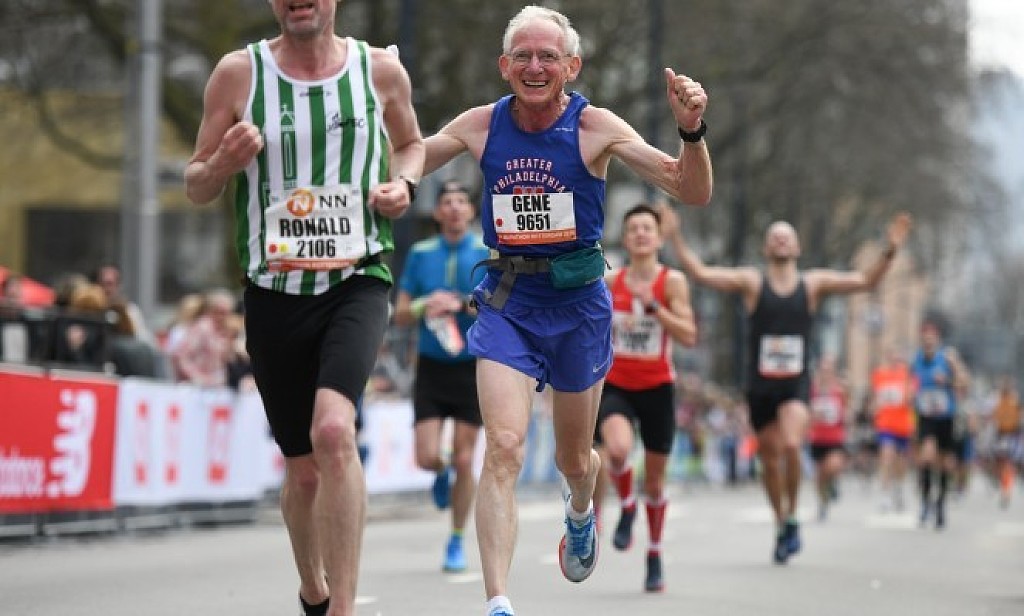Running News Daily
Running News Daily is edited by Bob Anderson. Send your news items to bob@mybestruns.com Advertising opportunities available. Train the Kenyan Way at KATA Kenya and Portugal owned and operated by Bob Anderson. Be sure to catch our movie A Long Run the movie KATA Running Camps and KATA Potato Farms - 31 now open in Kenya! https://kata.ke/
Index to Daily Posts · Sign Up For Updates · Run The World Feed
Articles tagged #Ed Whitlock
Today's Running News
Tommy Hughes Matches Legendary Ed Whitlock’s 65+ 5K Mark in Belfast
On August 2, 2025, at the Victoria Belfast Parkrun, 65-year-old running sensation Tommy Hughes clocked a blistering 17:24 for 5K — tying the official world best for men aged 65–69.
The mark equals the time set by the late Canadian master runner Ed Whitlock, who ran 17:23 25 years ago at age 67. Whitlock’s record has long been one of the most revered in masters running, symbolizing an extraordinary blend of speed and longevity.
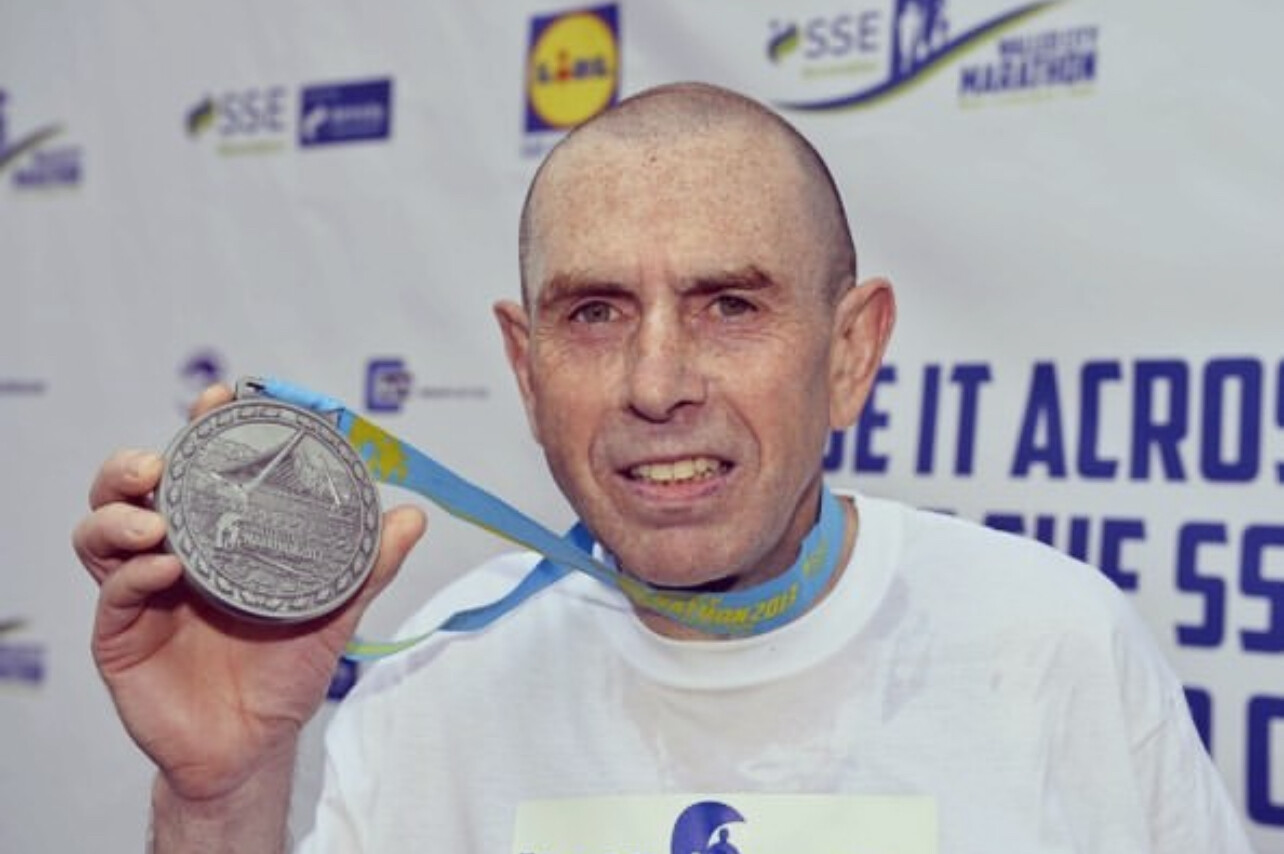
Hughes, known for his remarkable consistency and endurance across decades of racing, once again demonstrated that age is no barrier to elite-level performance. His run in Belfast was not only fast but also symbolic — a connection between two generations of masters running legends.
The Victoria Belfast Parkrun, part of the global Parkrun network, provided the perfect backdrop: a fast, flat course and a supportive running community. For Hughes, it was another milestone in a career that has spanned everything from marathons to track distances, and now includes a share of one of the most iconic age-group marks in distance running history.
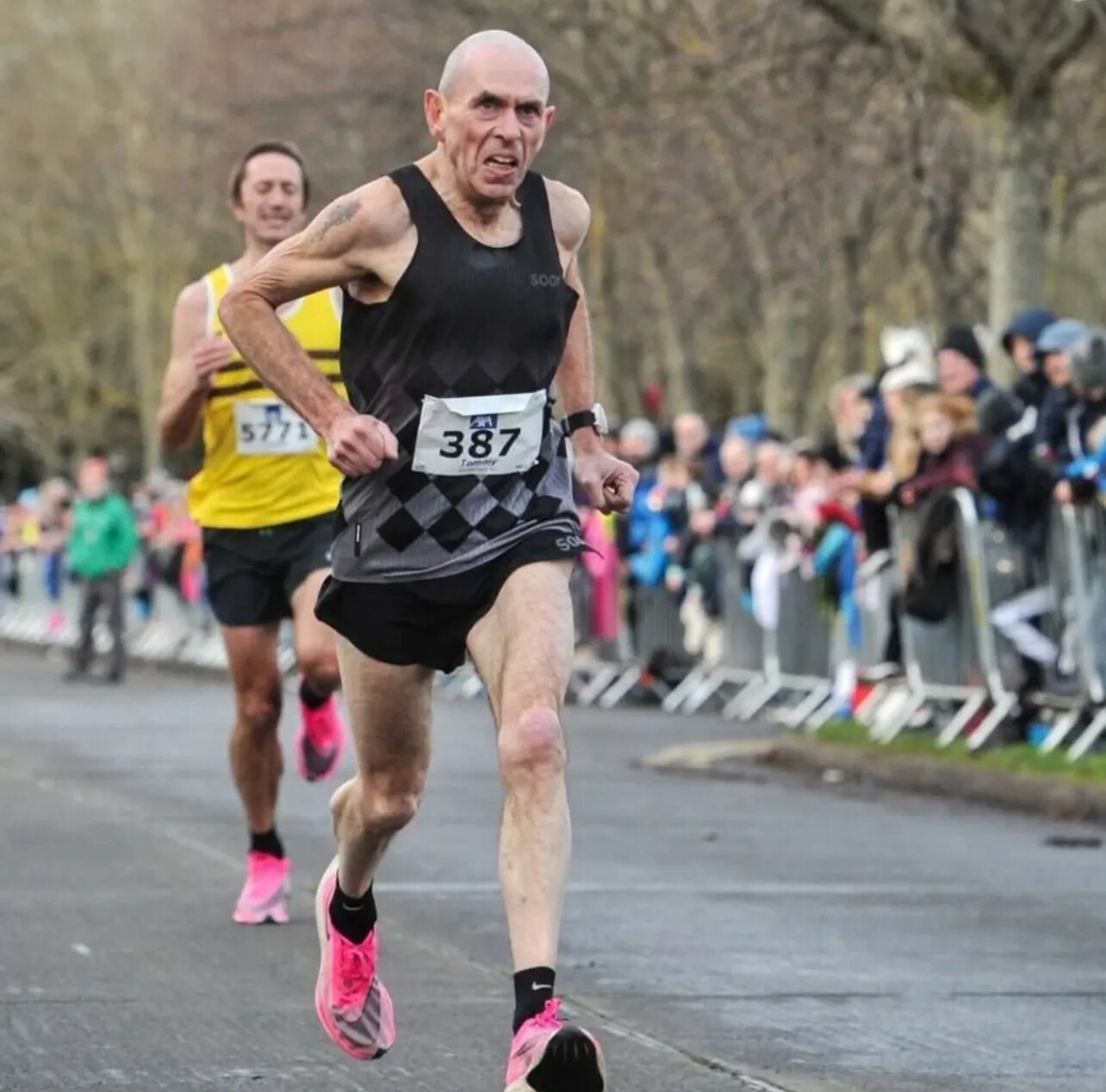
With Hughes still in top form, the question now is whether he can find that extra second to eclipse Whitlock’s long-standing time — and make the record fully his own.
by Boris Baron
Login to leave a comment
Tommy Hughes at 65 Still Breaking Records and Defying Expectations
Tommy Hughes is not just running into his golden years—he’s racing through them at world-record pace. Now 65 years old, the legendary Irish marathoner continues to show that age is just a number when matched with grit, discipline, and passion.
Born on January 8, 1960, Hughes has been rewriting the masters record books for the past several years. At age 60, he stunned the running world by clocking a 2:30:02 marathon, setting a new M60 world record—a blistering pace of 3:33 per kilometer. But he hasn’t stopped there.
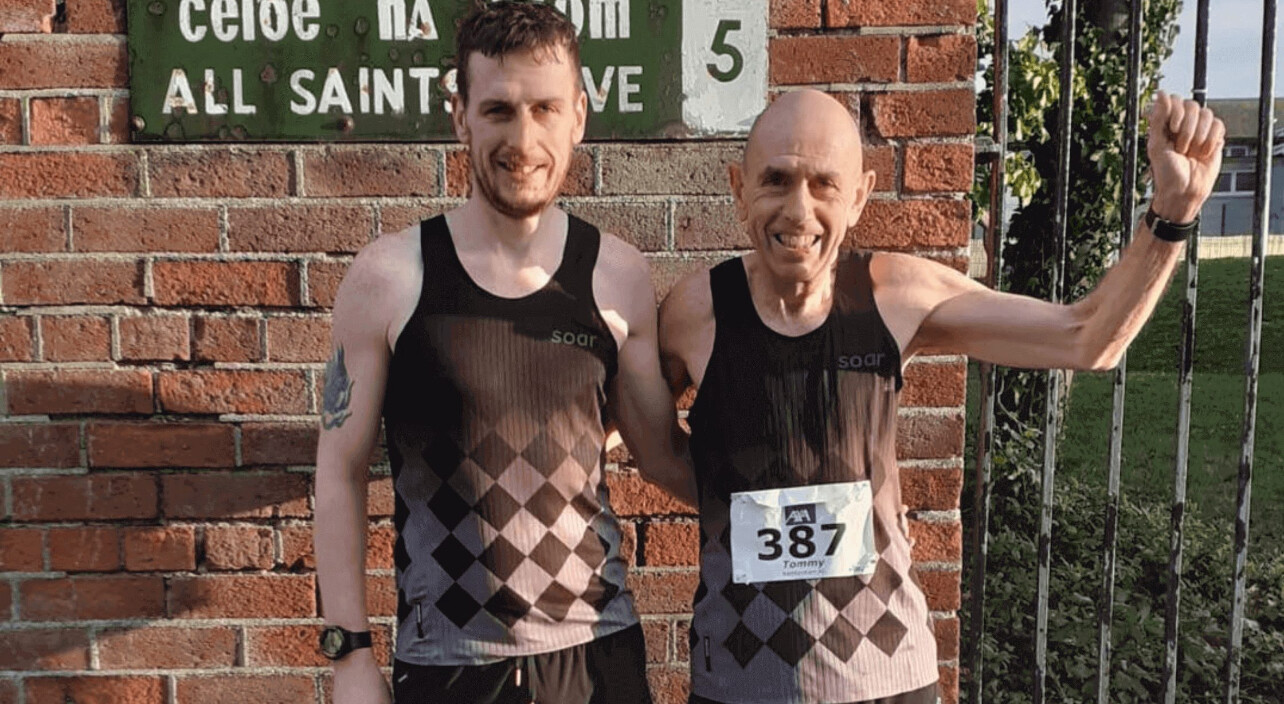
In May 2024, at 64 years old, Hughes ran the Belfast Marathon in 2:36:37, setting a new single-age world record for age 64. Despite battling a severe cold, he executed a well-paced race with a negative split, proving once again that his training and racing instincts are second to none.
Just two months later, in July 2024, Hughes added another major accomplishment to his resume by breaking the M60 10-mile world record, clocking 58:13 at the Portaferry 10-mile race—surpassing the legendary Ed Whitlock’s previous mark.
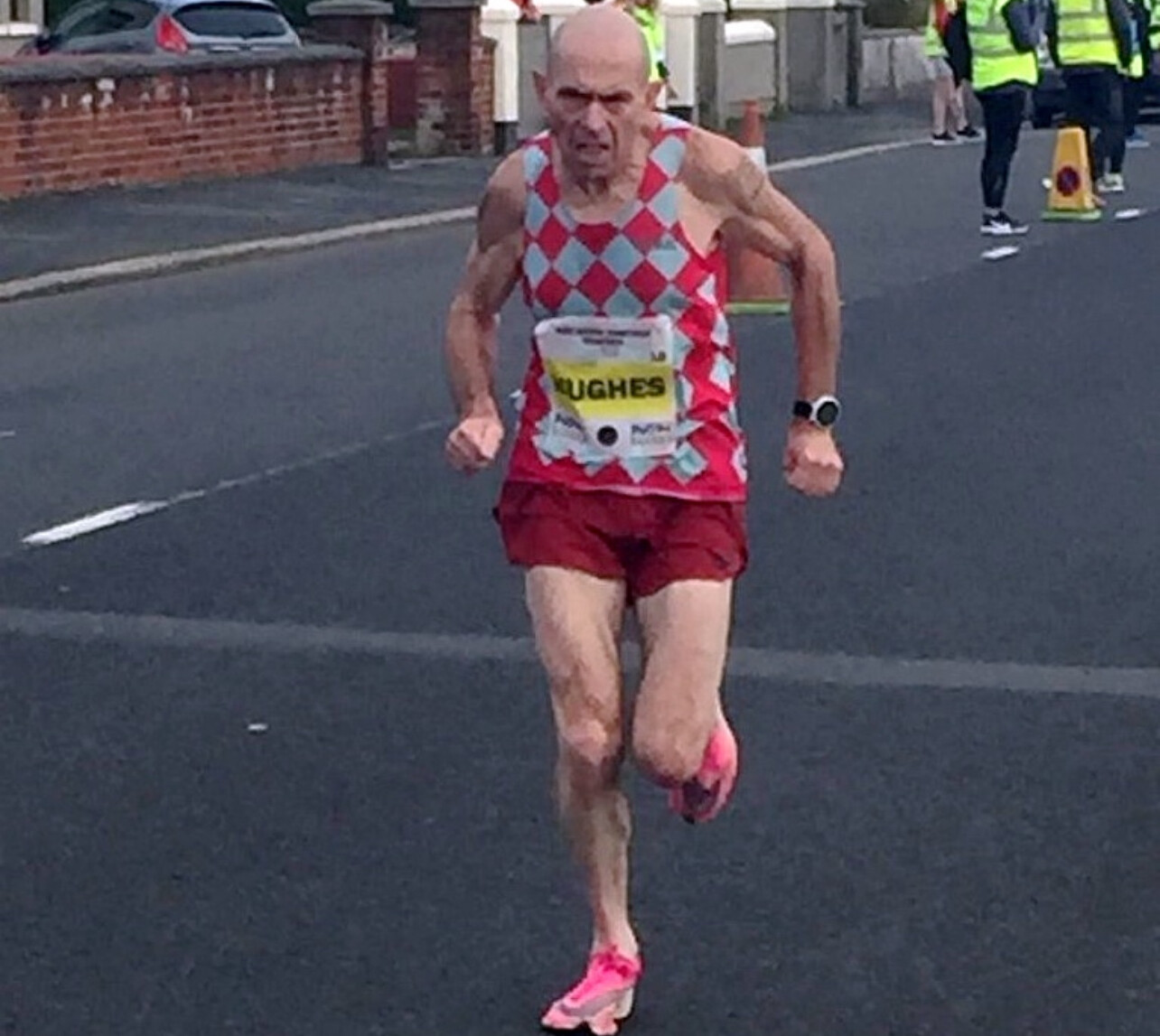
Now in the M65 age group, Hughes has his sights set on the marathon world record for this category: 2:41:57. Given his consistency and recent form, the running community is watching closely—few would be surprised if he takes that record down too.
Hughes’ achievements are all the more remarkable considering his personal journey. He began running at age 23, worked for decades as an electrician, and overcame serious challenges, including a battle with alcoholism. In 2018, he had surgery for a parathyroid tumor—a turning point that led him to embrace sobriety and double down on his running.
In addition to his individual accolades, Hughes shares a unique father-son accomplishment: in 2019, he and his son Eoin set the Guinness World Record for fastest combined father-son marathon time(Tommy in 2:27:52 and Eoin in 2:31:30 at the Frankfurt Marathon).
Today, Hughes helps with his daughter’s business and continues to train with the same determination he had decades ago. His story is one of persistence, reinvention, and inspiration—not just for master runners, but for athletes of all ages.
Tommy Hughes proves that you don’t age out of greatness—you just run into it.
by Boris Baron
Login to leave a comment
Racing Into Shape The Role of Frequent Racing in Building Fitness and Speed
Many runners believe that the best way to race well is to train hard, peak for an event, and taper properly. While this is a proven approach, another method—racing into shape—has helped some of the world’s most remarkable runners achieve outstanding results. One of the best examples is Ed Whitlock, the Canadian running legend who set multiple age-group world records. Whitlock didn’t follow conventional training methods. Instead, he relied on a combination of long, steady runs and frequent races to sharpen his fitness. His approach raises an important question for competitive runners at all levels: Can racing more often help you reach peak performance?
The Benefits of Racing Into Shape
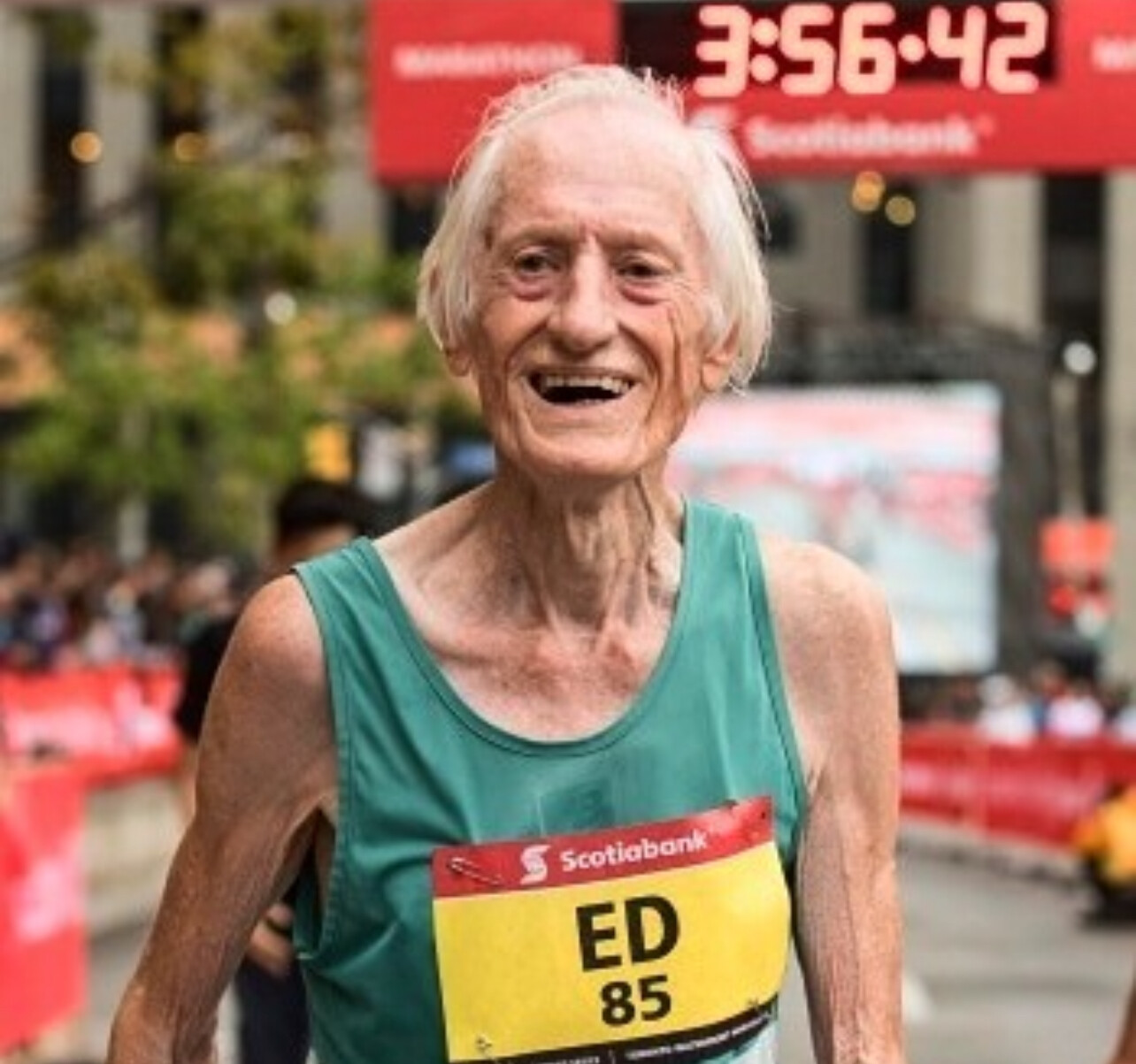
Racing is more than just a test of fitness—it can be a key component of training. Many experienced runners have discovered that racing frequently provides unique physical and mental benefits that structured workouts alone cannot replicate.
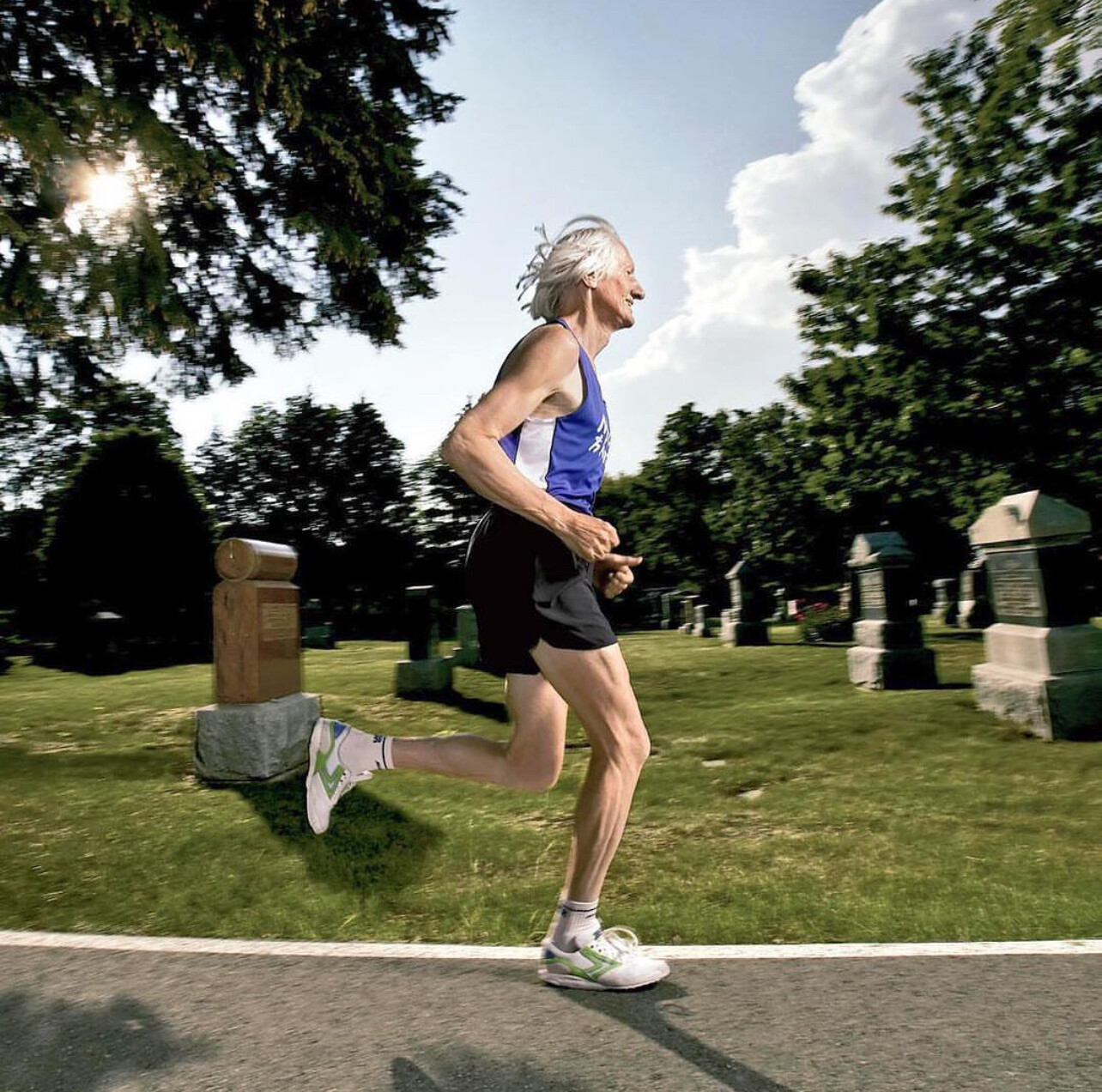
1. Race-Specific Conditioning– Hard workouts simulate race conditions, but they rarely match the intensity of actual competition. The adrenaline, pacing, and pressure of a real race push runners beyond what they typically achieve in training. Racing often teaches the body to handle fatigue and sustain effort at higher intensities.
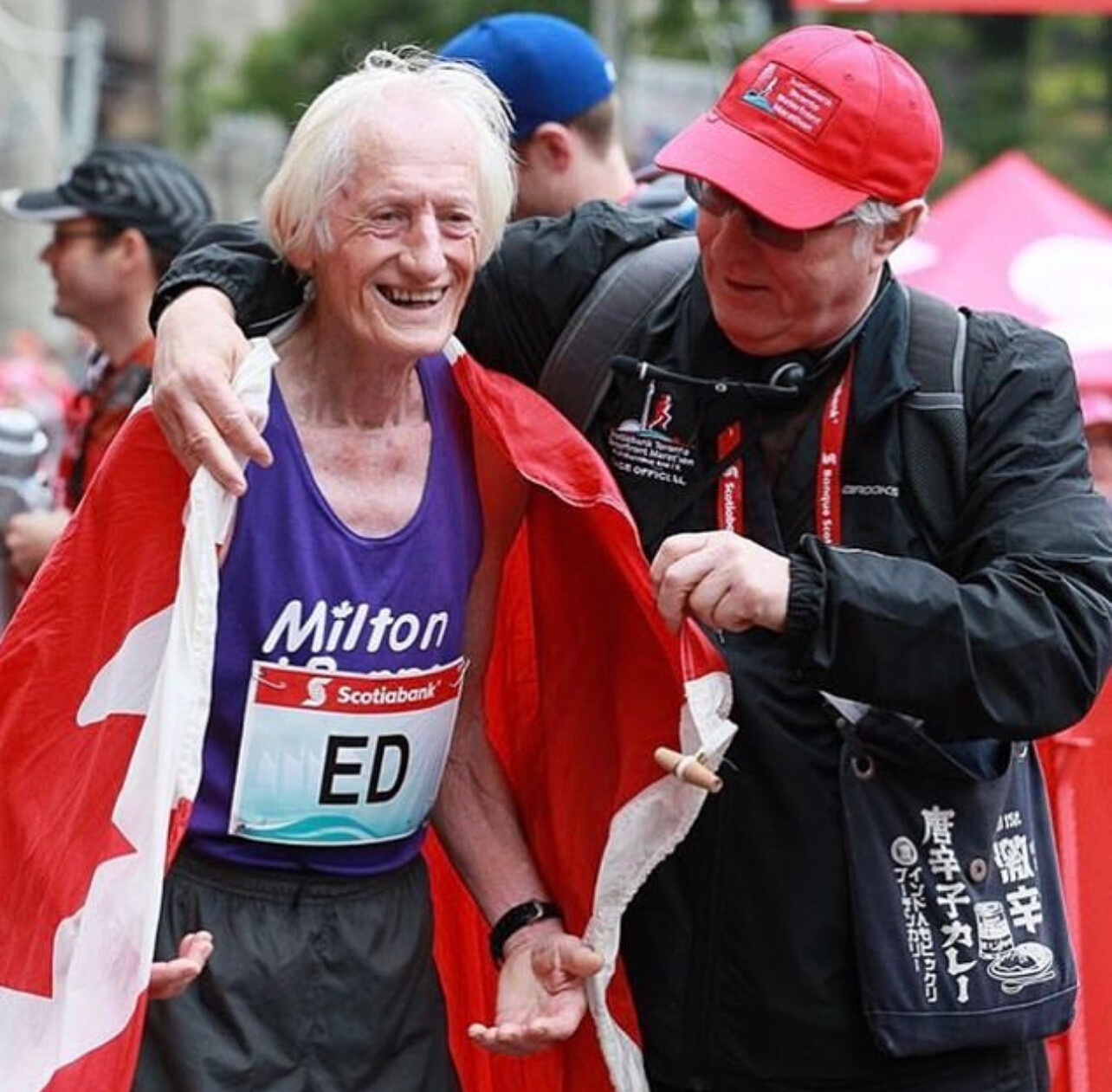
2. Mental Toughness– Confidence and experience play a huge role in racing success. Lining up at the start line regularly helps runners develop a sense of comfort in competition. The more you race, the better you understand pacing, strategy, and how to manage discomfort.
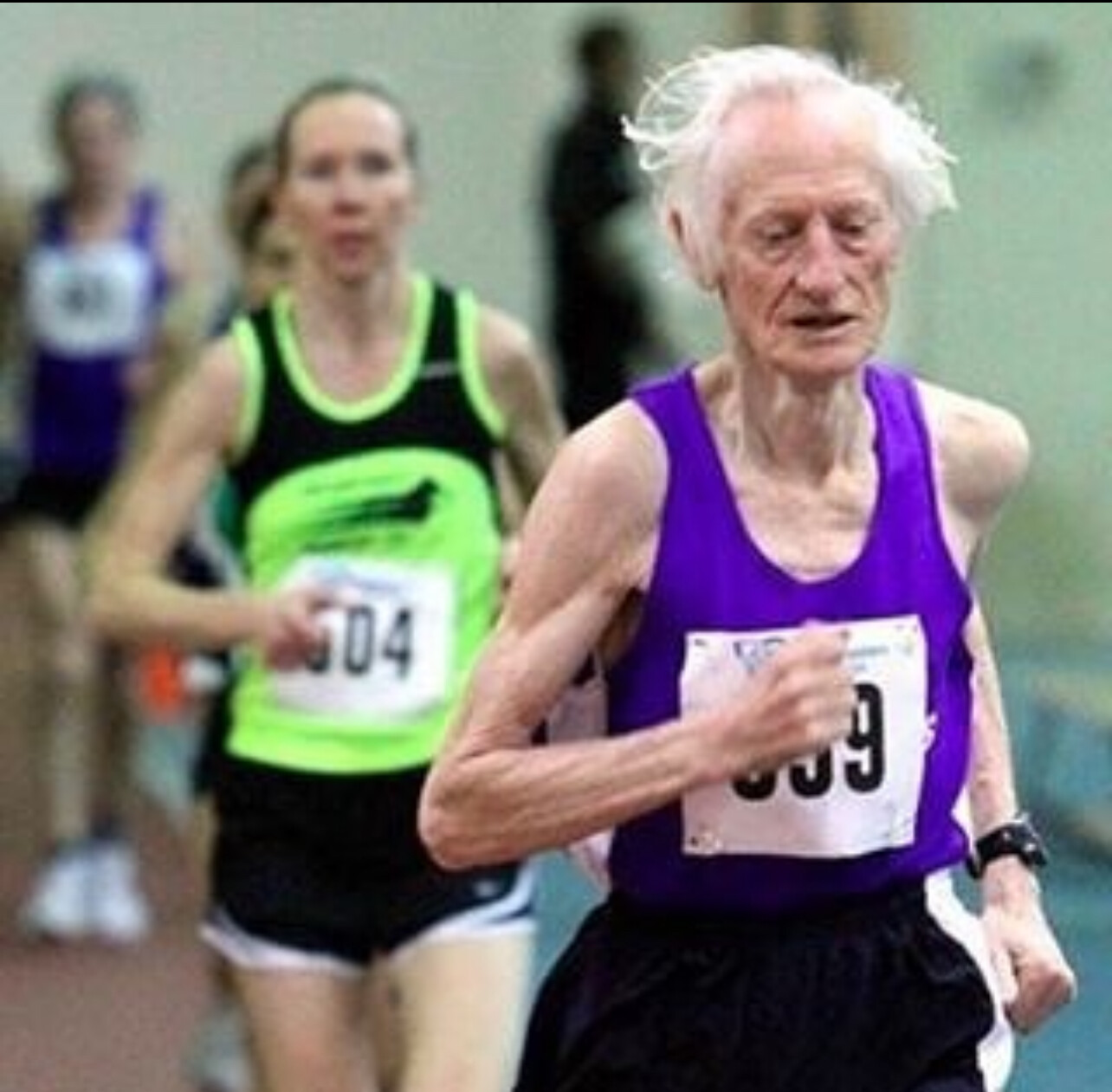
3. Pacing Mastery– Many runners struggle with pacing, going out too fast or leaving too much energy on the table. Racing frequently provides opportunities to fine-tune pacing strategy through trial and error, helping runners learn what effort feels sustainable at different distances.
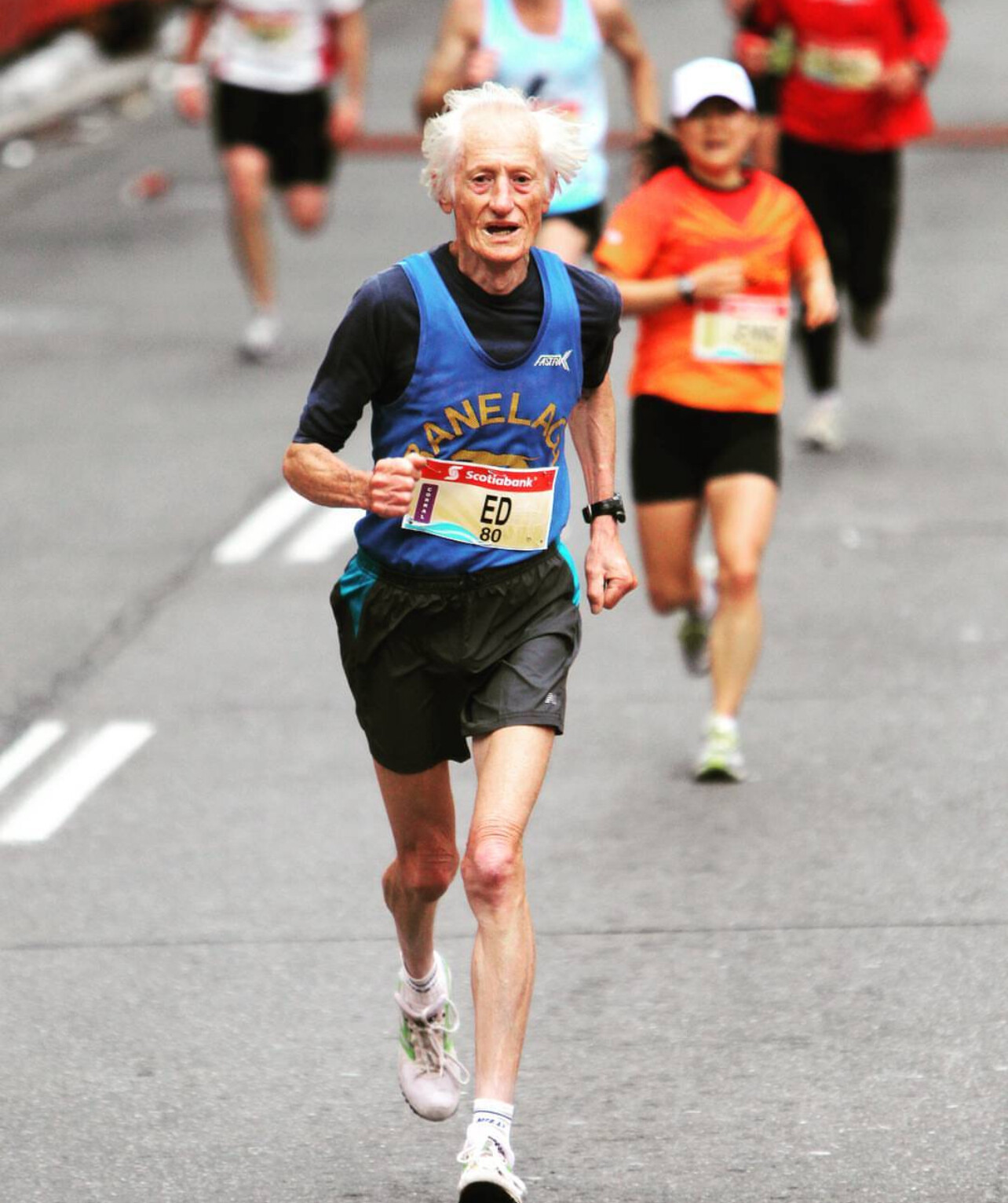
4. Improved Recovery and Adaptation– Racing forces the body to recover efficiently. Over time, this repeated cycle of hard efforts followed by recovery leads to better adaptation, strengthening the muscles, cardiovascular system, and mental resilience needed for peak performance.
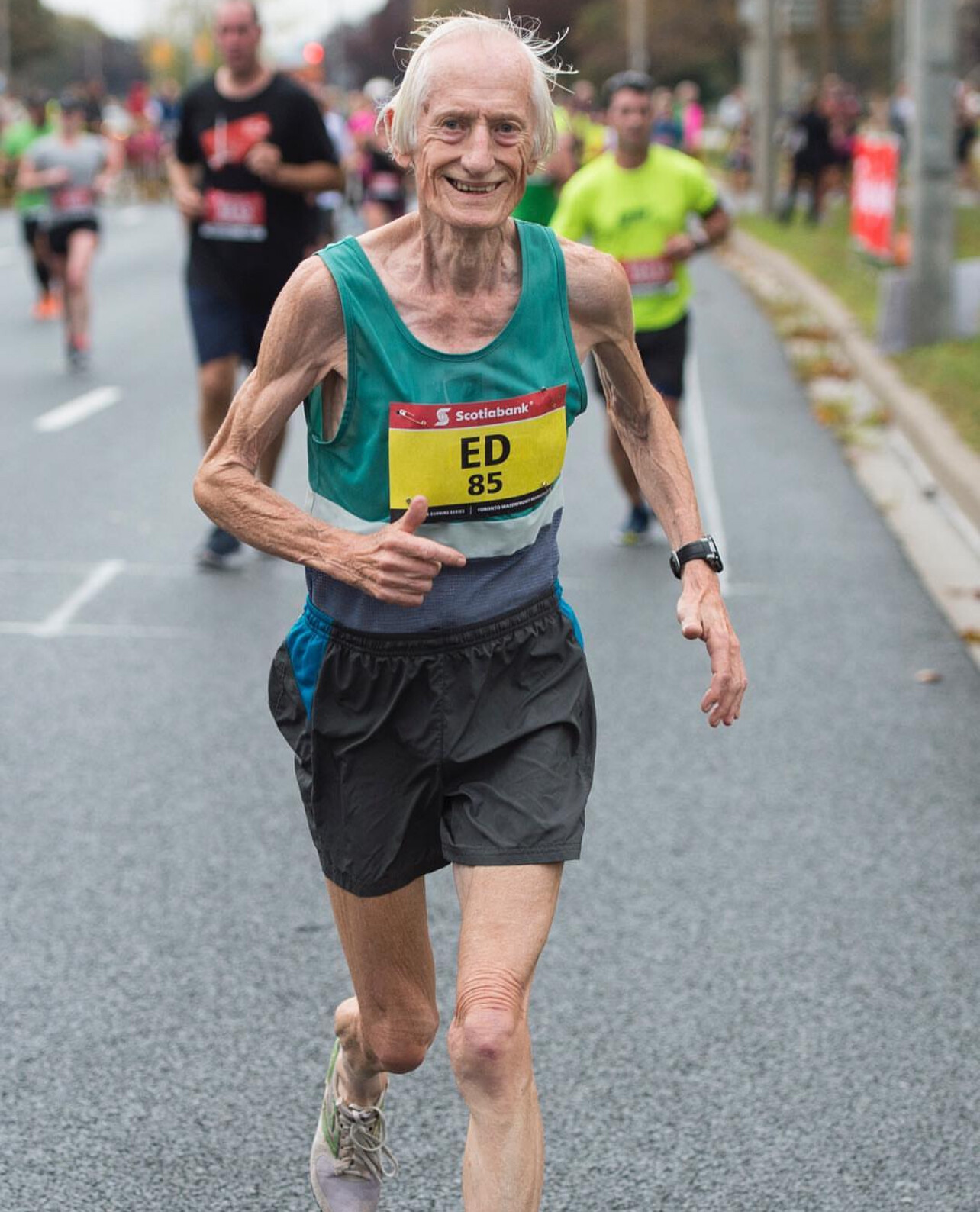
5. Keeping Training Fresh– Some runners burn out from monotonous training cycles. Frequent racing keeps motivation high, provides tangible benchmarks of progress, and eliminates the need for excessive structured speedwork, as race efforts themselves serve as high-intensity sessions.
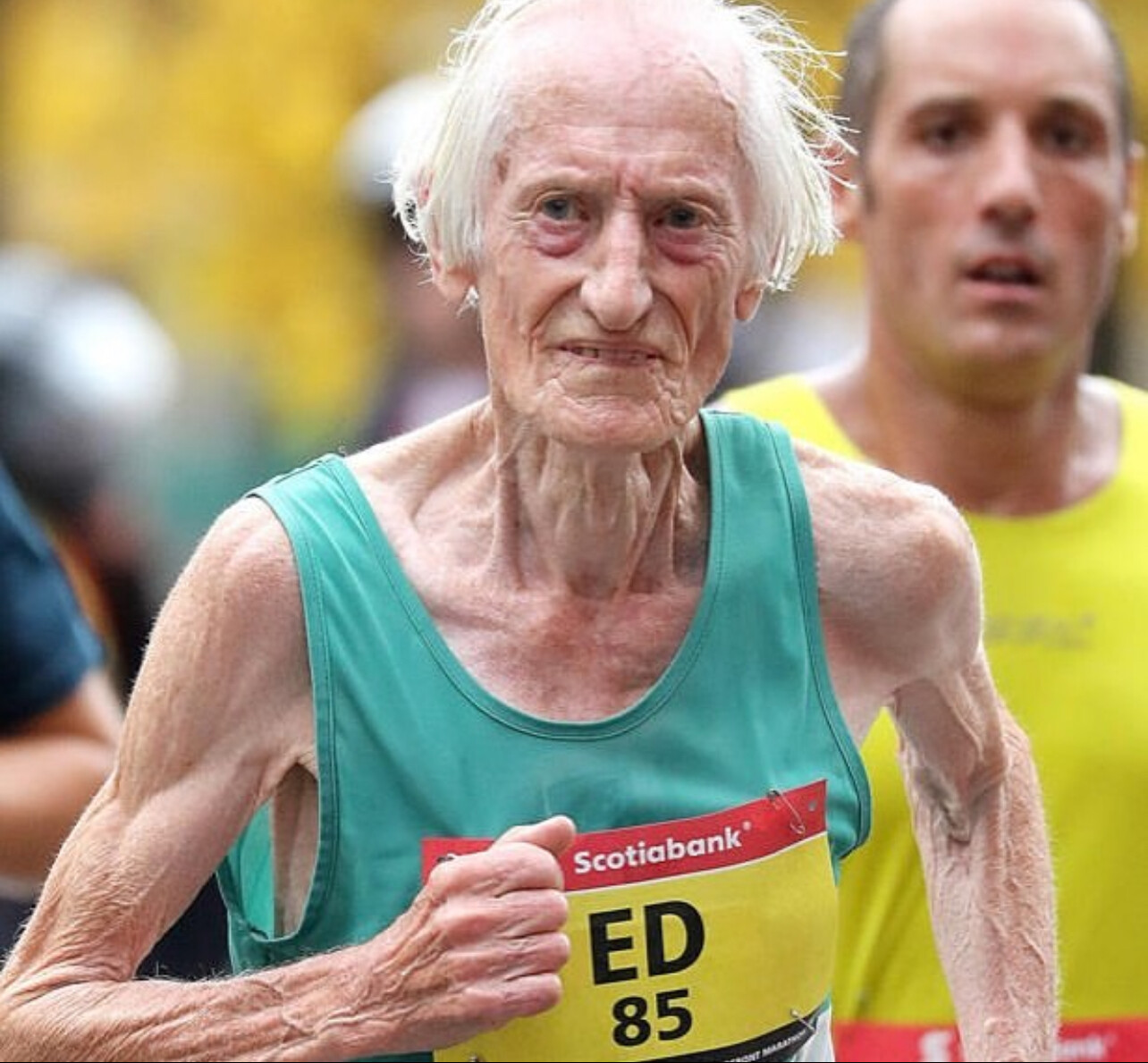
Ed Whitlock’s Racing and Training Philosophy
Whitlock’s results prove that racing into shape can work at the highest level. At age 72, he became the first person over 70 to break three hours in the marathon, running 2:59:10 in Toronto. Four years later, at 76, he shattered the 75+ world record with a time of 3:04:54. Even into his 80s, he continued setting records, running 3:15:54 at age 80 and an astonishing 3:56:33 at 85. His ability to recover quickly and use racing as part of his training set him apart from other masters runners. Whitlock’s approach was simple—he avoided speedwork, instead running for hours at a time in a cemetery near his home, logging high mileage at an easy pace, and letting races provide the intensity needed to maintain world-class fitness.
How to Incorporate Racing Into Your Training
While racing frequently can be beneficial, it needs to be approached with balance. Ed Whitlock, for example, complemented his frequent races with long, slow runs, often lasting two to three hours, to build his aerobic base. His method allowed him to develop incredible endurance while keeping his legs accustomed to race conditions.
1. Choose the Right Distances– Shorter races, such as 5Ks and 10Ks, can serve as speed workouts, while longer races, like half marathons, help with endurance. Mixing distances allows for well-rounded fitness without excessive strain.
2. Adjust Training Around Races– Racing frequently means adjusting your weekly training load. Instead of doing hard interval sessions, let races serve as your speedwork. Recovery runs and easy mileage should make up the bulk of non-race days.
3. Use Races as Workouts– Not every race has to be run at full effort. Some can be used as controlled tempo efforts, negative-split exercises, or even progressive runs where you finish strong.
4. Listen to Your Body– Racing too often without adequate recovery can lead to fatigue or injury. Pay attention to how your body responds and be willing to skip races or reduce intensity when necessary.
5. Gradually Build Race Frequency– If you’re not used to racing often, start by adding one race per month and increase as your body adapts. Some runners thrive on weekly races, while others need more time between efforts.
Does Racing Into Shape Work for Everyone
While frequent racing has proven effective for runners like Ed Whitlock, it’s not for everyone. Some runners respond better to structured training and carefully planned peaks. However, for those who enjoy competition and recover well, racing often can be a powerful tool for improvement. The key is to balance high-intensity race efforts with proper recovery and easy mileage to avoid burnout.
Racing into shape is an old-school yet highly effective training philosophy that has helped runners achieve world-class performances. It builds mental toughness, improves pacing, and strengthens the body’s ability to handle sustained effort. Whether you’re chasing personal bests or simply looking to keep training exciting, frequent racing could be the missing piece in your running journey. If it worked for Ed Whitlock, it might work for you.
Ed would do three hour training runs around a cemetery at a very easy pace (third photo).
by Boris Baron
Login to leave a comment
88-year-old runner completes his 12th consecutive Athens Marathon
On Sunday at the historic Athens Marathon, 88-year-old Ploutarchos Pourliakas became the oldest finisher at this year’s race, crossing the line in six hours and 31 minutes—a full 20 minutes faster than his 2023 finish.
Defying both age and limits, Pourliakas completed his 12th Athens Marathon as part of the event’s 41st edition. Known as “The Authentic Marathon,” this race traces what is believed to be the original path taken by Athenian messenger Pheidippides, who ran to announce the Greek victory over the Persians in the Battle of Marathon, nearly 2,500 years ago.
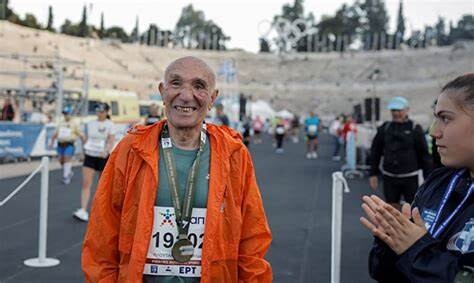
Pourliakas reached the finish line at the Panathenaic Stadium, the venue of the first modern Olympics in 1896, surrounded by his family and grandchildren. “I achieved to finish and even improved on last year,” he told Reuters in an interview. “I feel younger than my 88 years.”
His philosophy for longevity in running is simple: moderation and consistency. “I’ve never smoked. I don’t drink, and I eat in a balanced way,” said Pourliakas. He revealed that he does enjoy a daily sip of tsipouro, a traditional Greek brandy, saying he considers it more as a health tonic than as a drink.
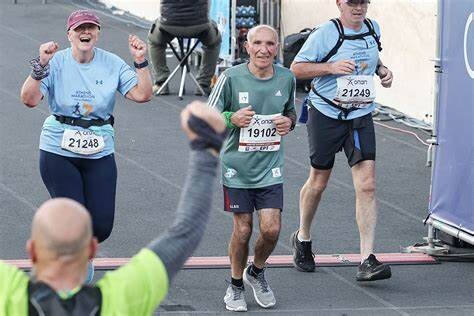
According to Reuters, Pourliakas began running at age 73, inspired by his son, who is an ultramarathoner. Now, Pourliakas follows a dedicated training regimen in his hometown of Kastoria, logging five kilometres on weekdays and 15 to 20 kilometres on weekends.
Pourliakas’s story echoes that of Canadian masters running legend Ed Whitlock, who also started running later in life. In 2000, Whitlock became the oldest person to complete a sub-three-hour marathon at age 69 and later set the men’s 85+ world record, with a time of 3:56:38, at the 2016 Toronto Waterfront Marathon. Like Whitlock, Pourliakas’s commitment and discipline inspire runners of all ages to keep pushing their limits.
“Why wouldn’t you believe it? We all can do it. As long as we want to,” Pourliakas said.
by Marley Dickinson
Login to leave a comment
Athens Marathon
The Athens Classic (authentic) Marathon is an annual marathon road race held in Athens, Greece, normally in early November. The race attracted 43.000 competitors in 2015 of which 16.000 were for the 42.195 km course, both numbers being an all-time record for the event. The rest of the runners competed in the concurrent 5 and 10 kilometers road races and...
more...90-year-old TCS London Marathoner sets British masters record
The desire to help those battling the same disease that claimed his sister fuelled David Picksley of Croydon, Surrey, to claim the British 90+ men’s marathon record at this year’s TCS London Marathon. Picksley, the oldest of the more than 48,000 runners at this year’s event, finished the race with a time of 7:16:46.
He becomes the first to record a master’s marathon record in the British male 90+ category. Previously, the oldest British male marathoner on record was Alf Gibson, who at age 85 ran the 1993 London Marathon in 5:48:09. In 2002, Jenny Wood-Allen set the standing record in the British 90+ women’s category, running the London Marathon in 11:34:00.
In Canada, the record in the oldest men’s masters group is held by the late Ed Whitlock, who topped the men’s 85+ category with a 3:56:38 marathon finish in Toronto in 2016.
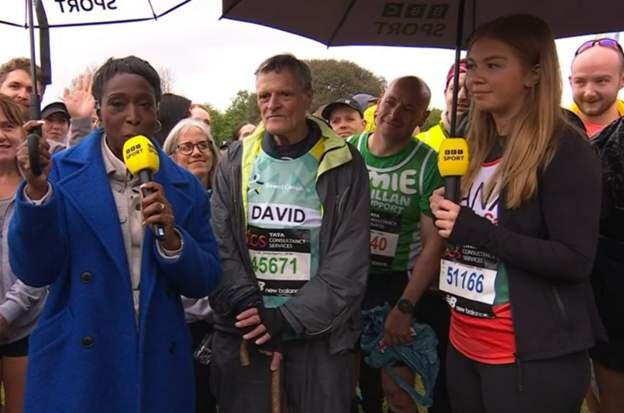
Picksley entered this year’s marathon as a fundraiser for JustGiving, a U.K. charity aimed at eradicating bowel cancer, and has raised more than $12,000 for the organization through this year’s marathon.
“When my sister April was diagnosed in 1973 with bowel cancer, this was generally seen as a death sentence,” Picksley shares in a statement on his fundraising page. “She died just a few months later at 42, with three young children. Now, almost 50 years on, of those in the UK diagnosed at the earliest stage, 97% will survive five years after their diagnosis. Currently, only just under 40% of cases are diagnosed at an early stage. The focus of the policy and the influencing work of Bowel Cancer UK over the next three years is to improve early diagnosis. I am walking the London Marathon in 2023 to recognise the improvements made in the last 50 years, and to support their campaign, to save more lives by spreading knowledge of the symptoms.”
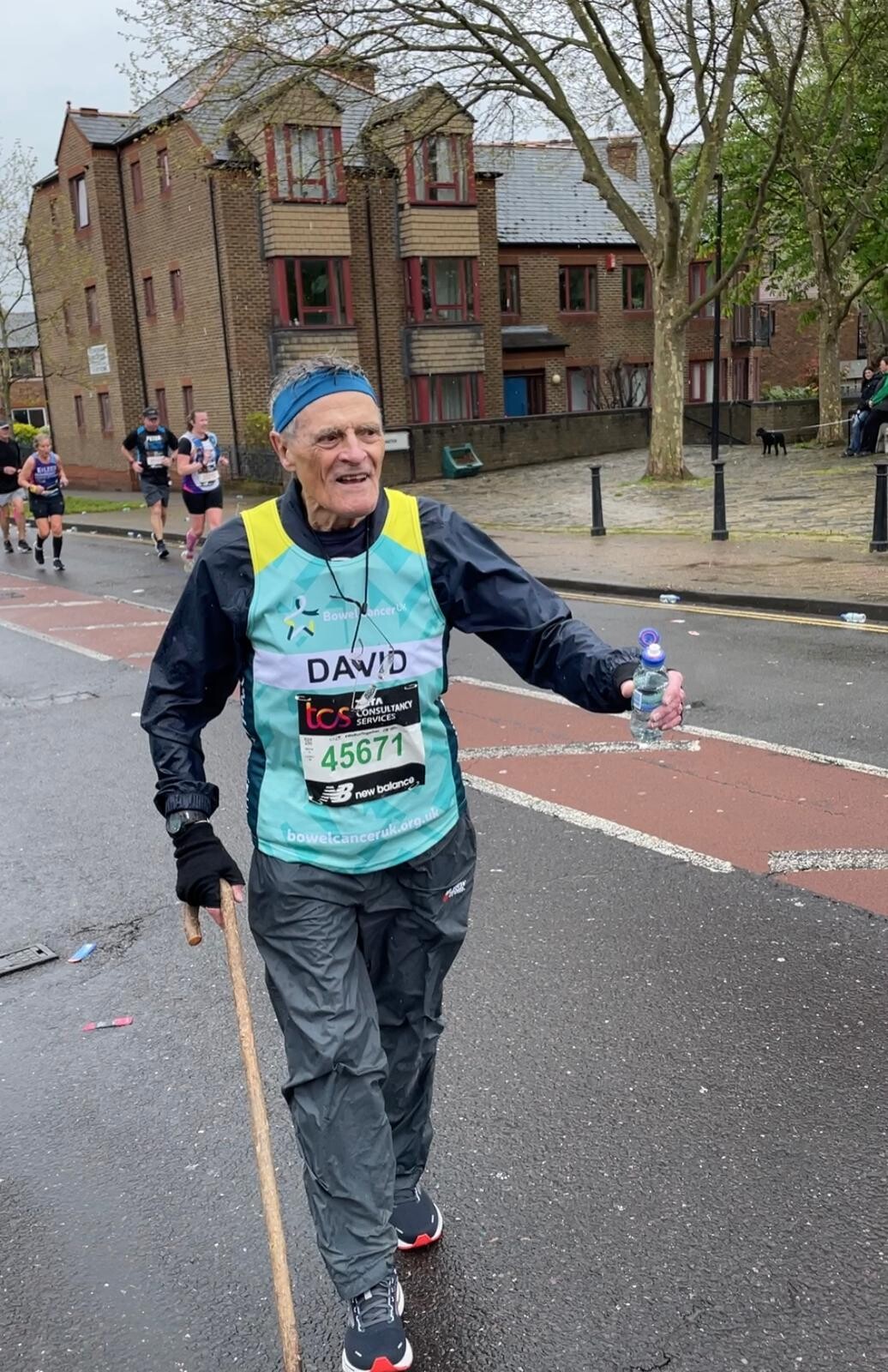
The TCS London Marathon course is familiar territory for Picksley, who has a long history going the 42.2-km distance.
“In my 50s and 60s I ran 13 marathons, including 4 in London, and since those days I have been enjoying a walk with my stick, early every morning,” says Picksley. “Latterly that had become a lockdown habit, and when a Virtual London Marathon was introduced, I took it on. After a finish in under 7.5 hours in 2021, I did it again in 2022, in 7:13:15, just 3.5 minutes over the ‘good-for-age’ over-85 age category.”
In a video tweeted by TCS London Marathon organizers, Picksley says “it feels wonderful, it really does,” to have finished the event at age 90.
Asked if he “might have a small glass of something to celebrate,” Picksley replies: “Yeah, I should think I will. I might even make it a big one.”
by Paul Baswick
Login to leave a comment
TCS London Marathon
The London Marathon was first run on March 29, 1981 and has been held in the spring of every year since 2010. It is sponsored by Virgin Money and was founded by the former Olympic champion and journalist Chris Brasher and Welsh athlete John Disley. It is organized by Hugh Brasher (son of Chris) as Race Director and Nick Bitel...
more...Enhance your training with the Jevitty app for masters runners
A new health and fitness app has been created out of Vancouver to enhance the performance of the current and next generation of masters runners. Jevitty is an app that tracks your progress on essential health metrics like body fat percentage, distribution, lean mass and bone density with one tap of the finger, helping you get the most out of your training while you age
The app takes the user’s current lifestyle and body composition information and provides them with a health score rating out of 200. When the user moves into a healthier way of living, that health score is updated in real-time, giving them a chance to track their progress.
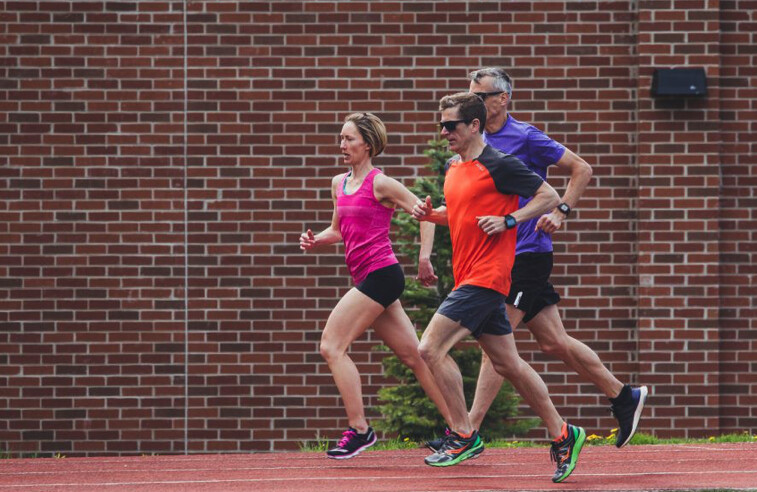

You can also sync the Jevitty app with your fitness tracker or GPS smartwatch and track other metrics like heart rate, sleep quality, activities and even how much oxygen your body uses while running (VO2 max).
The mind behind the app is Jerry Kroll, an experienced masters marathoner who found his inspiration while trying to break the three-hour barrier at the 2005 Toronto Waterfront Marathon at age 42. He was passed in the final few kilometres by the late Canadian running legend, Ed Whitlock, who ran 2:58:40 to become the world’s oldest man to run a sub-three-hour marathon.
“We want to change the way people think about life by giving them access to tools, professionals and services they need to turn the fear of getting older into a dream to be achieved,” says Kroll. “The app is a fun, engaging, research-informed way to create an optimal balance of body and mind and help redefine people’s true potential.”
At the 2022 Vancouver Half Marathon in June, Jevitty teamed up with Canada Running Series to offer a cash prize for the oldest sub-two-hour finisher. Janet Pritchard of Burnaby (W65-69) and Rick Horita of White Rock, B.C., (M70-74) won the inaugural Golden Shoe Award.
“We hope the award inspires younger athletes to live healthier when they are older and keep running,” says Kroll.
The company plans to reach out and partner up with more races around Canada to bring more awareness to Jevitty’s mission. “We want to ensure people are getting out to exercise regardless of age,” says Kroll.
The Jevitty app just launched for iOS users and will soon be available for Android.
by Running Magazine
Login to leave a comment
How Jo Schoonbroodt smashed the world 70 plus marathon record
At an age where many of his contemporaries are winding down, the man they call the Grey Kenyan is somehow speeding up. On Sunday Jo Schoonbroodt, a 71-year-old from Maastricht, ran a marathon in a staggering 2hr 54min 19sec to become the fastest septuagenarian in history.
A few days later, when the Guardian catches up with him, his achievement is still sinking in. “I only started jogging at 36 because my doctor told me I had high cholesterol,” he says, chuckling. “But last year I ran 7,242 kilometres [4,450 miles], which is more than double what I did in my car.”
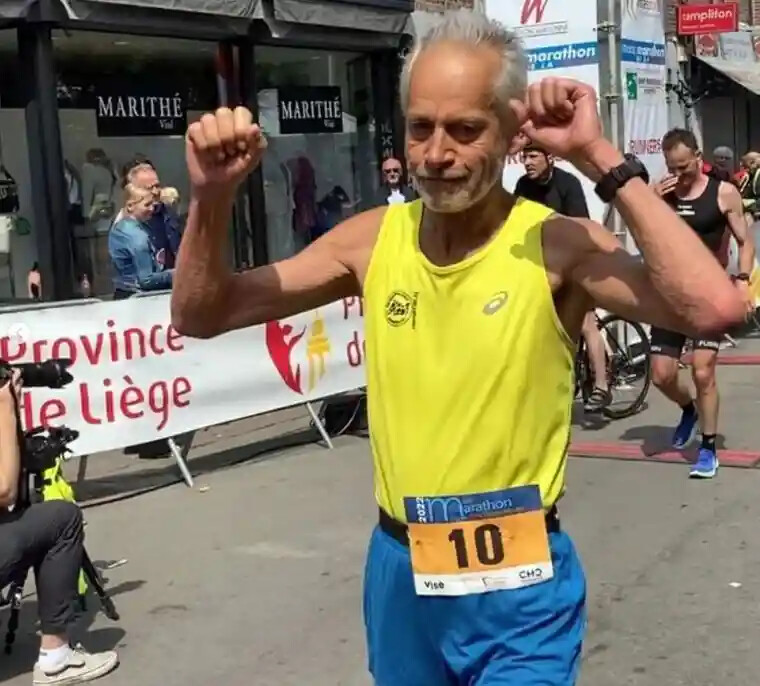
It also turns out that Schoonbroodt’s new 70+ world record, set at the Maasmarathon of Visé in Belgium, was inspired partly by an unlikely source: the Flemish crooner Eddy Wally. With a few miles remaining, he knew he was just ahead of the previous best, set by Gene Dyckes in 2018, because a friend was following him on his bike and barking out his lap times. But his legs were starting to get heavier.
“However, my friend had a special trick to keep me on track,” says Schoonbroodt, who was wearing a yellow and blue kit in support of Ukraine. “He picked up his phone and put Eddy Wally’s song Chérie, Chérie on repeat. I’ve always loved it, I don’t know why. It gave me a boost in morale. I overtook one runner after another and, despite getting cramp in the final 500m, I was able to break the record by four seconds.”
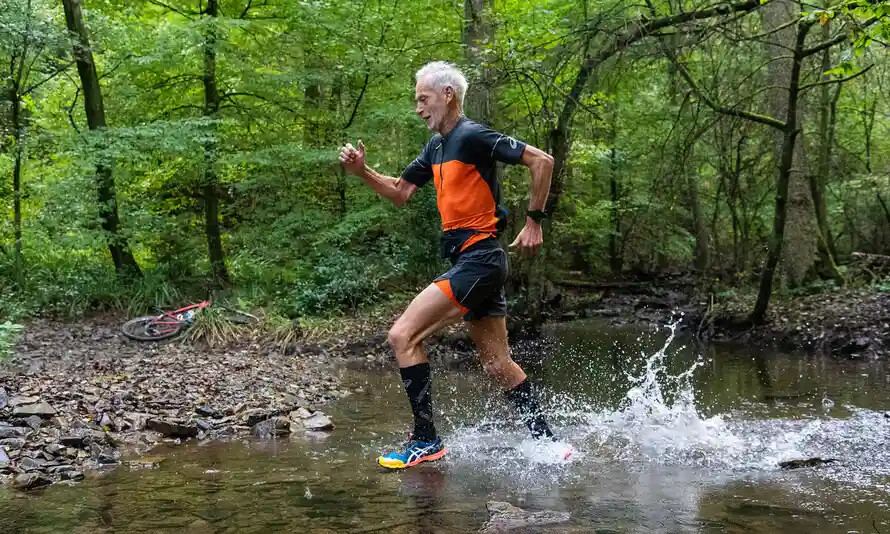
Incredibly it was Schoonbroodt’s 75th sub-three-hour marathon, and it came only four weeks after his 74th at the Rotterdam marathon. For good measure, the flying Dutchman also holds a number of ultra running records. He is clearly no ordinary Jo. But the secrets of his success might surprise you.
“Most runners train too hard. I do a lot of my training with groups who run very slowly. And then I build on these basics with some faster interval training. But I don’t do the same stupid distance 10 or 20 times – I prefer to have a lot of fun with my running.”
Schoonbroodt often runs at nine- or 10-minute mile pace, far slower than the 6:38min miles he ran for 26.2 miles to set his world record, but he says the crucial thing is he listens to his body. “A lot of people follow a training plan or coach and push on even when their body is saying: ‘No, this is not a good day to do it.’ But if you go out the door and just do what you feel, it’s easier to keep running and stay injury-free.”
He also dismisses the idea that runners need to do anything special with their diets. “Diet? No, no,” he scoffs. “No diet! I eat double portions, of course, with all these calories I burn. I love pasta and potatoes. But whatever is on the table, I eat it.”
He has a similarly relaxed attitude when it comes to alcohol. “I prefer the French wine and the Belgian beer. Not too much, and mostly on weekends. Wine is just a grape drink, so it’s made from nature. And Belgian beer is special. And if you do all this with your body,” he adds, referring to the 85 miles he still runs each week, “you need to give it something back. And this is what I give back to the body!”
Schoonbrot is a former IT worker and can tell the exact day he started running – 1 January 1986 – and how many kilometres – 120,000 – he has done since. But he stresses he was no natural. At first people called him Jogger Jo, because he was slow. Nowadays he gets called the Grey Kenyan – a nickname given to him years ago by a race announcer as he blasted past athletes a third of his age.
Being a late bloomer, he believes, has actually helped him because his ego never had to worry about chasing faster times of his youth. “Because I started so late, I missed my best years. But that’s no problem. Everything is still new to me.”
Schoonbroodt also cites the new range of carbon-plated “super shoes”, which have swept the running world over the past five years, as a key factor. On Sunday he ran in the Asics Metapeed Sky, and has been an ambassador for the Japanese company for the past four years, preaching the positive benefits of exercise to sceptics and lapsed practitioners.
But while Schoonbrodt’s achievements are exceptional, he is not the only old master to defy conventional wisdom. Several men older than 70 have run a sub-three-hour marathon – the first of whom, Ed Whitlock, who died in 2017, also ran a 3:15 marathon after turning 80.
So what might explain this phenomenon? John Brewer, a sports scientist at the University of the West of Scotland, points out that while we experience a 10% decline in muscle mass every decade as we age, the decline isn’t as sharp for endurance. “The scientific evidence shows that you can maintain your aerobic capacity – your Vo2 max – very effectively into old age,” he says.
“And if you look at where we are now compared to 40 years ago, the advances in nutrition, sports science, recovery and technology, all mean that it is more feasible for people in their 60s and 70s to produce good performance if they follow the right training.”
Brewer, who was also part of England’s backroom staff for the 1990 World Cup, says Schoonbrodt’s story carries another message – that it is never too late. “People think they can’t turn it around after years of no exercise or poor diets,” he says. “Well, actually you can.”
Schoonbroodt, meanwhile, has no plans to put his feet up. “My next marathon is in two and a half weeks, on an old Roman road built 2,000 years ago,” he says, the excitement obvious. It will be his fifth in 2022. And with that he is off. After all, the quest for a 76th sub-three-hour marathon waits for no man. Not even one who is 71.
by Sean Ingle (The Guardian)
Login to leave a comment
Maas Marathon De La Basse-Meuse
Ever since the initial steps, in 1999, all the organizers, the towns, cities and municipalities involved in this 26.2 mile challenge have constantly been expressing their delight at their investment. Over the years, we have noticed the marathon participants looking for races that are able to offer an extra and original dimension in terms of the circuit and activities. We...
more...71-year-old Jo Schoonbroodt ran 2:54:19 at Maasmarathon in Belgium to break the M70+ world record by 29 seconds
Over the weekend (May 8, 2022) at the Maasmarathon of Visé in Belboom, Belgium, Jo Schoonbroodt of the Netherlands broke Ed Whitlock’s M70+ marathon world record of 2:54:48 by 29 seconds. Schoonbroodt ran 2:54:19 to win the men’s 70-74 age category (by an hour and a half) and also set the M70+ world record.
Schoonbroodt set out with the a goal of running under three hours to complete the 75th marathon he has run under the three-hour barrier, but he had a slight tailwind in the first half of the course, covering it in 1:26:18. The second half was into the wind, but Schoonbroodt tucked in behind another runner to help mitigate the effect.
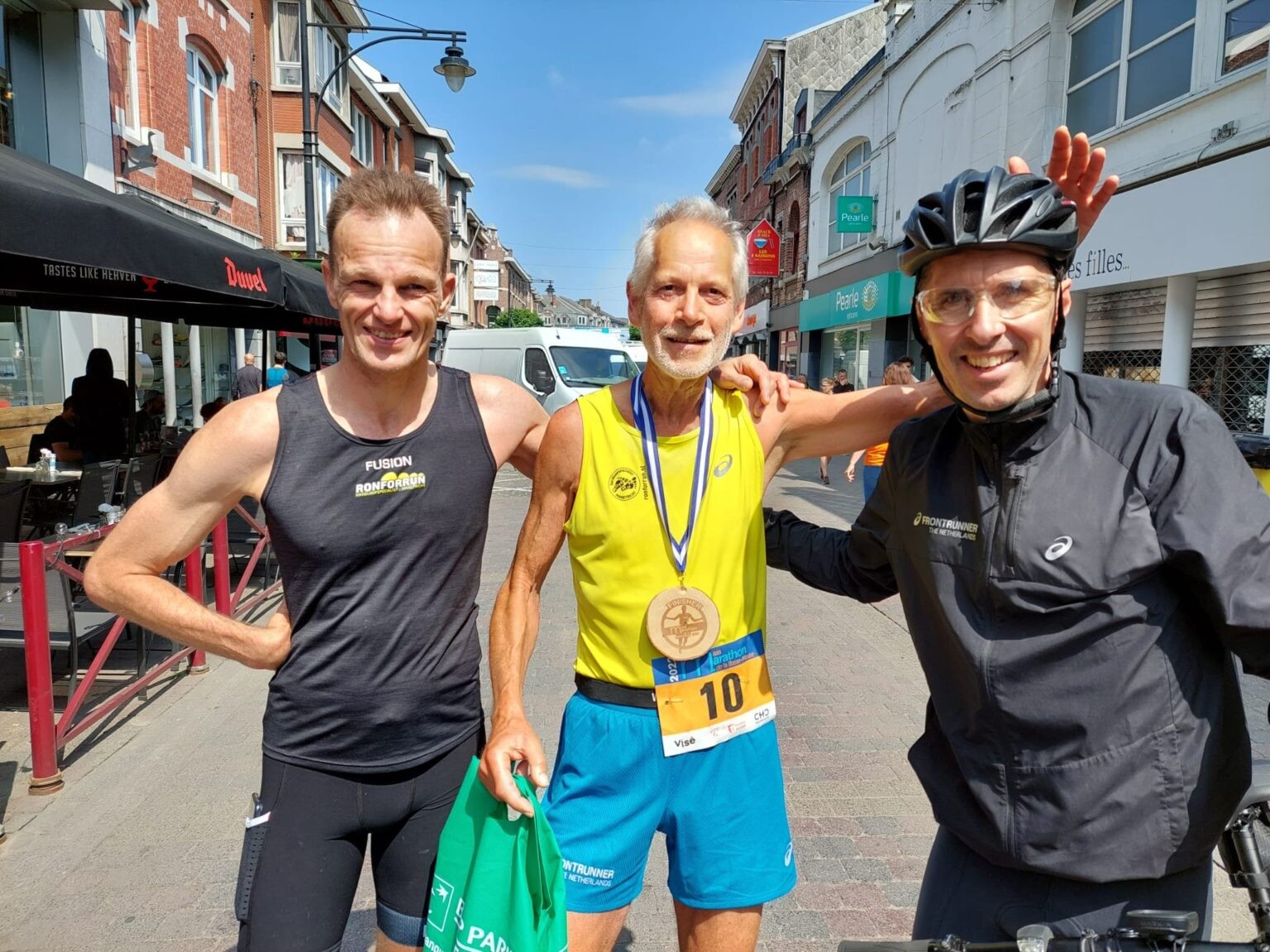
His time not only beat Whitlock’s official record of 2:54:48, but also U.S. masters runner Gene Dykes unofficial record time of 2:54:23 by four seconds; Dykes ran this time at the Jacksonville Marathon in 2018, only to discover the course was not sanctioned by USATF.
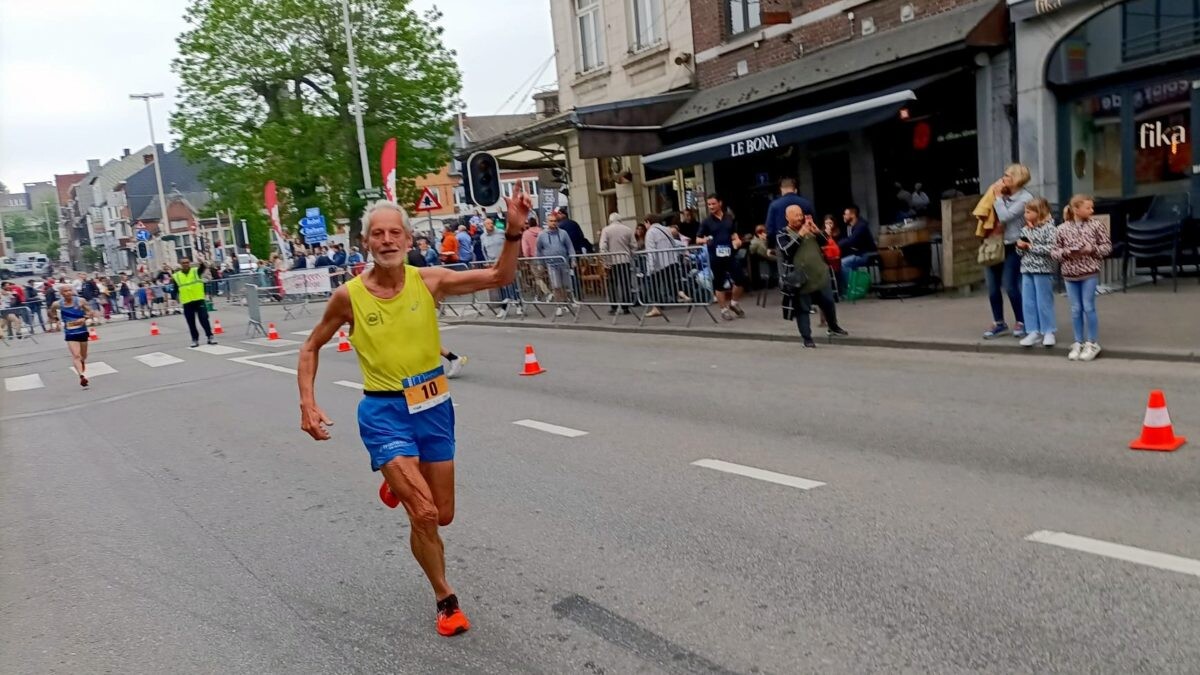
We reached Dykes for a comment: “I’ve been watching with anticipation for Jo to break the record!” he told us in a Facebook message. “My odds of retaking the lead this fall are extremely long–I’m looking forward to tussling with Ed at M75 next year. It would appear that Jacob Nuris going to wipe out the M70 records three years from now.”
According to Strava, Nur is a runner from Elk Grove, Calif. He is 66. And according to USATF, he broke the M65-69 American record in the 10K in November in Sacramento (35:42), as well as the 10-mile American record in 59:11 at the NorCal John Frank Memorial 10-Mile in March.
Schoonbroodt said on his Instagram page that he was not fixated on breaking the record before the race. “A time under three hours was my goal, but I am now happy I can call myself the fastest 70+ runner on the planet.”
This record is not Schoonbroodt’s first, as the Maastrict, Netherlands, resident ran the M60+ six-hour world record in 2012, covering almost 79 kilometres. “I have always been inspired to run by others,” Schoonbroodt says. “Hopefully this record inspires others around my age to start running.”
When the 71-year-old marathoner isn’t running, he is usually playing with his grandkids or hiking in the Dutch countryside. According to his website, he likes to live according to the motto of enjoying every day and being present in the moment.
by Running Magazine
Login to leave a comment
Maas Marathon De La Basse-Meuse
Ever since the initial steps, in 1999, all the organizers, the towns, cities and municipalities involved in this 26.2 mile challenge have constantly been expressing their delight at their investment. Over the years, we have noticed the marathon participants looking for races that are able to offer an extra and original dimension in terms of the circuit and activities. We...
more...Only three men in the world over the age of 70 have run a marathon in under three hours
History was made at the 2021 London Marathon held in October. Mike Sheridan became the first British runner over the age of 70 to complete the race in under three hours.
The 72-year-old finished the 26.2 mile course in an official time of 2:59.37, to write his name into the history books.
Mike Sheridan (first photo) also became only the third person in the world to achieve this feat.
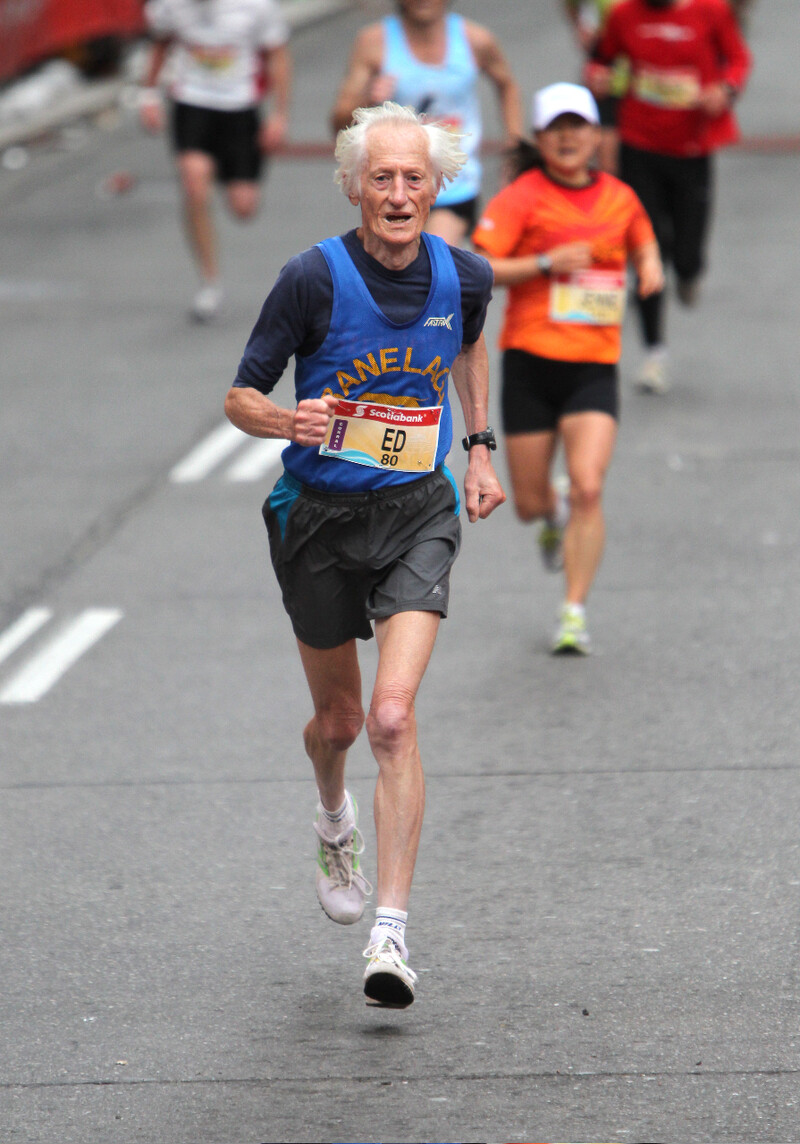
Ed Whitlock (second photo), who died in 2017, and Gene Dykes are the only other two who are on the list of runners over 70 to have completed a marathon in under three hours.
Ed Whitlock was an English-born Canadian long-distance runner, and the first person over 70 years old to run a marathon in less than three hours, with a time of 2:59:10 in 2003.
Whitlock, who ran as a teenager and took up the sport again in his forties, first became the oldest person to run a marathon in less than three hours in 2000, at the age of 69, with a time of 2:52:47. He later extended this record, running a time of 2:58:40 at the age of 74. At 73, he set a world record in the marathon for men 70 to 74, running a 2:54:48, his fastest time after turning 70.
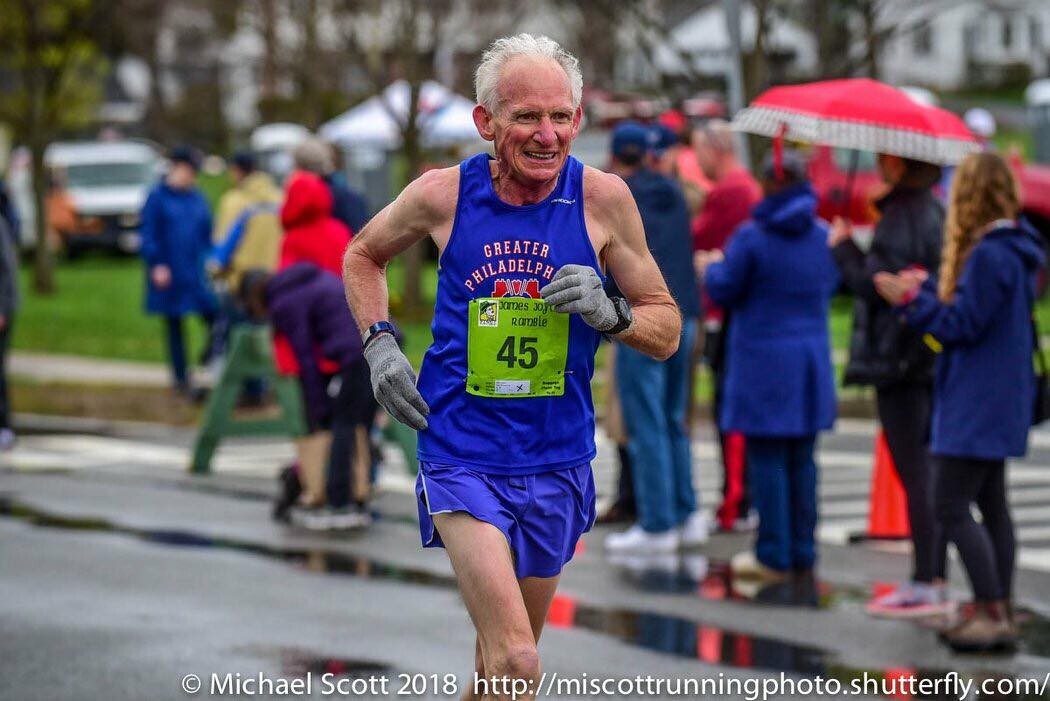
Gene Dykes (third photo) ran his best race, by his own estimation, on December 15, 2018, when he clocked a 2:54:23 at the Jacksonville Marathon. That gave Dykes, then 70, the fastest marathon ever by a 70+ runner. While his time can not be ratified as an official record, because the Jacksonville race was not USATF sanctioned, no one has questioned the legitimacy of the flat, certified, out-and-back course.
Dykes, from suburban Philadelphia, also ran two other sub-3:00s after turning 70 in April, 2018 — Rotterdam and Toronto.
The new member of the 70 plus sub three hour club, Mike Sheridan hit halfway in London in 1:30:16, but got quicker over the second half and his fastest 5km split of 20:41 came from 35km to 40km. He picked up an even faster pace over the last 2km.
The 72-year-old compared running a marathon to ‘physical chess’ as there is a lot you have to take into account.
“A marathon is physical chess,” he said. “You start on the start line, you know you have 26.2 miles to do, but you also know that the human body does not have enough reserves to run the whole thing flat out.
“You have to manage the conditions, other runners, the wind and the rain sometimes.
“You have to manage your own fuel sources and you have to carry gels and you have to top up at the right time.
“You have to eat properly and all of these things come into it and that’s why I call it physical chess.
“You can plan it very well, but if you get a headwind in the last 10 miles then you have a battle on your hands and you have to adapt. It’s why I love it, it is a brilliant distance really.”
Login to leave a comment
Jo Schoonbroodt 71 on May 10, 2022 ran 2:54:19 breaking the record. Now there are four 70+ runners under three hours. More to come I am sure too! - Bob Anderson 5/11 11:19 pm |
TCS London Marathon
The London Marathon was first run on March 29, 1981 and has been held in the spring of every year since 2010. It is sponsored by Virgin Money and was founded by the former Olympic champion and journalist Chris Brasher and Welsh athlete John Disley. It is organized by Hugh Brasher (son of Chris) as Race Director and Nick Bitel...
more...Gene Dykes breaks M70 50K world record clocking 3:56:43, breaking the previous record by nearly 19 minutes
On a sunny Sunday in East Islip, NY, Gene Dykes broke the M70 50K world record at the USATF national 50K road championships, crossing the finish line in 3:56:43. He beat the previous record of 4:15:55, set by Germany’s Wilhelm Hofmann in 1997, by nearly 19 minutes.
This is the third world record Dykes can add to his resume, along with his M70 100-mile and 24-hour records. While his time has yet to be ratified, this is an incredible accomplishment for the already-decorated ultrarunner. To make his run even more impressive, he completed another 50K trail race only two weeks prior to his record-breaking run, and it’s been barely one month since he ran 152 miles (245 kilometres) at the Cocodona 250 in Arizona.
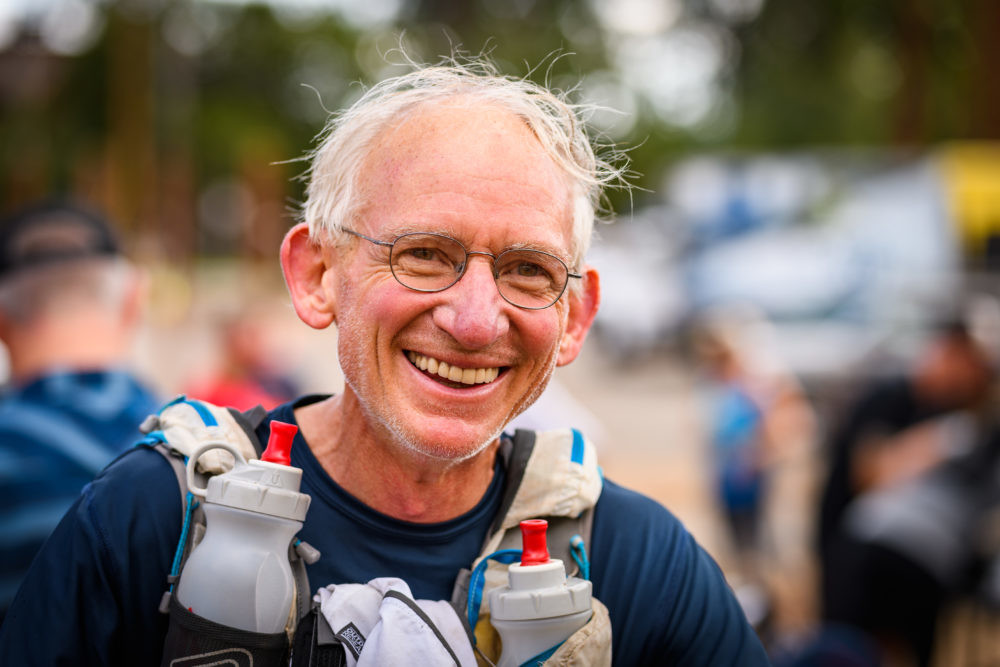
According to Dykes, the weather for Sunday’s race in Caumsett State Park was sunny, moderately windy, and not too hot, with temperatures hovering in the low 20s (Celsius) for most of the event. In a brief conversation with him after the race, he told Canadian Running (in a half-joking, half-serious manner) that he credits Canada’s late Ed Whitlock, one of the most decorated masters runners who ever lived, with his new 50K record.
“Thank you, Ed Whitlock, for never running a 50K,” he says.
Dykes is still aiming to take down Whitlock’s M70 marathon world record of 2:54:48, which he will attempt to do at this year’s London Marathon on October 3.
by Running Magazine
Login to leave a comment
The benefits of running after 60
Running after 60 can be as beneficial to your health as it was in your 20s.
There’s no doubt that if you run for fitness your speed will slow down as you age.

From your 30s onwards, a number of physical changes take place in the average person’s body. Aerobic capacity decreases, muscle mass reduces, muscle elasticity reduces, lung elasticity declines, bone density reduces, your metabolism slows, body fat increases, and your immune system becomes weaker, Owen Barder writes in the book “Running for Fitness.”
All these changes have an adverse effect on running performance. Yet, older runners can continue to achieve amazing athletic feats.

Benefits of running after 60
Canadian athlete Ed Whitlock ran a marathon in 2:54:48 at the age of 73. Carlos Lopes set the world marathon record at the age of 38. Hal Higdon, marathon runner and writer, at the age of 52 ran a 10km in 31:08 and a marathon in 2:29:27.
So you can’t run as fast as you did in your 20s and 30s. It’s all relative. The fact is you can continue to run into your 90s.
The health benefits of running for seniors are generally the same as for everybody else. They include reductions in the risks of heart disease, diabetes, high blood pressure, and cancer; reduced depression and anxiety; weight control; improved bones, muscles, and joints; improved mobility and coordination, and a psychological sense of well-being.
The risk for developing debilitating conditions increases as you grow older, so the benefits of running are increased.
Keep in mind that even moderate running is good for your health. At the conference of the European Society of Cardiology, Danish researchers presented data on a subset of 2000 joggers. They found that jogging at a moderate pace for a total of one to two-and-a-half hours per week over two or three sessions reduced the risk of death more than 44 percent over non-runners.
“Surprisingly, when individuals ran faster, longer or more frequently than this, the protective benefits of running disappeared,” writes Rashelle Brown. “Individuals who ran more often and more vigorously had about the same mortality rate as those who were sedentary.”
Another study looked at others health benefits of running for seniors: the effects of running versus walking on functional movement of 30 adults with an average age of 69. The study found that those who ran several days per week walked with the same muscular economy of average 20-year-olds.
If you want to start running for the first time or take up running after a long lull, it’s important to start out slowly.
First, you should let your doctor know of your plans and take heed of any concerns she might have.
Starting out with a walk or run program is a great strategy to build your muscles and endurance without risking injury that will set you back. Keep in mind walking can be just as health as running, except you have to walk longer to get the same health benefits as running.
Recovery after running
You also have to prioritize recovery more than when you were younger and build this into your running schedule. Also, use your experience to make more informed choices about your running.
Muscle mass declines with age, so you need some strength training to counter that. Just don’t overdo it. Stressing core exercises or using light dumbbells would do the trick.
Be diligent about stretching, both before and after exercise. As you age your flexibility decreases, and stretching compensates for that.
Other advice includes booking a regular massage to loosen the muscles that tighten from running, eating well (meaning a diet high in protein, carbs, fruits and vegetables), going soft by running on surfaces with some give like trails or even grass, and staying motivated.
“Keep entering races so you always have goals,” Jo Pavey writes in Runner’s World. “If you feel your fastest times are behind you, think about setting yourself a new set of (personal bests) for your new age group.”
by Janet ODell
Login to leave a comment
Gene Dykes was hoping to break Ed Whitlock's M70 record at STWM, but a lingering illness has taken him out of contention
Gene Dykes, who came close to breaking the late Ed Whitlock’s M70 marathon world record at last year’s Scotiabank Toronto Waterfront Marathon, and broke it unofficially in Jacksonville, Florida in December (on a non-record-eligible course) was hoping to make another attempt at this year’s Scotiabank Toronto race on October 20, but has decided to bow out due to illness and the resulting loss of training time.
Whitlock’s record, set in 2004, is 2:54:48. He was the only person ever to run a sub-3 marathon over age 70 until Dykes, who has now done it four times: first in Rotterdam in 2018, where he ran 2:57. At last year’s Scotiabank Toronto (which doubled as the World Masters Marathon Championships), he ran 2:55:18, missing Whitlock’s record by 30 seconds. At Jacksonville, he ran 2:54:23, breaking the record by 25 seconds–or so he thought, until he discovered that although the course is certified, the race is not USATF-sanctioned, which means you can’t set records there. At Boston this year he ran 2:58:50, shattering his own age-group course record of 3:16:20.
Dykes is optimistic he is on the mend, and has a number of fall races scheduled, including a 100K in Texas this weekend, a small marathon in Maine (on the same day as he would have raced Scotiabank), and the New York City Marathon on November 3.
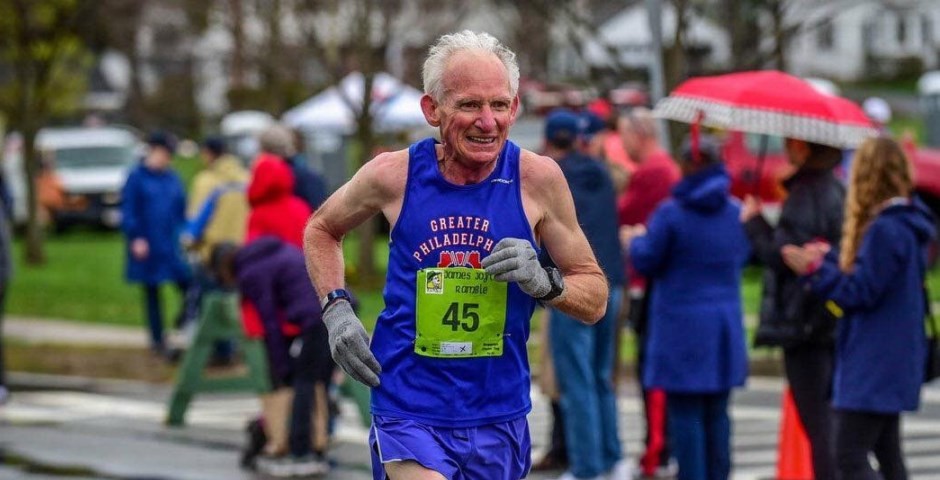
Dykes remains the only living human over 70 years of age to run a sub-3 marathon.
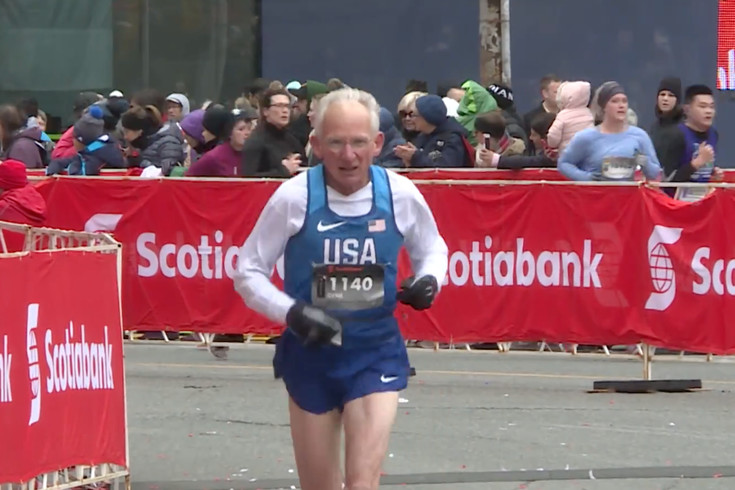
by Anne Francis
Login to leave a comment
TCS Toronto Waterfront Marathon
The Scotiabank Toronto Waterfront Marathon, Half-Marathon & 5k Run / Walk is organized by Canada Running Series Inc., organizers of the Canada Running Series, "A selection of Canada's best runs!" Canada Running Series annually organizes eight events in Montreal, Toronto and Vancouver that vary in distance from the 5k to the marathon. The Scotiabank Toronto Waterfront Marathon and Half-Marathon are...
more...Gene Dykes did it again by setting new US 100-mile and 24-hour M70 records in Pennsylvania
Gene Dykes, aka the #Ultrageezer, is a modest fellow, not given to trumpeting his achievements (especially after discovering that his takedown of Ed Whitlock’s M70 marathon world record at Jacksonville in December 2018 would not be ratified due to the race not being a USATF-sanctioned event).
This could be why we only just learned that last month at the Dawn 2 Dusk 2 Dawn 24-hour ultramarathon in Sharon Hill, Pennsylvania (not far from where he lives), in the pouring rain, Dykes quietly broke the M70 100-mile and 24-hour track records.
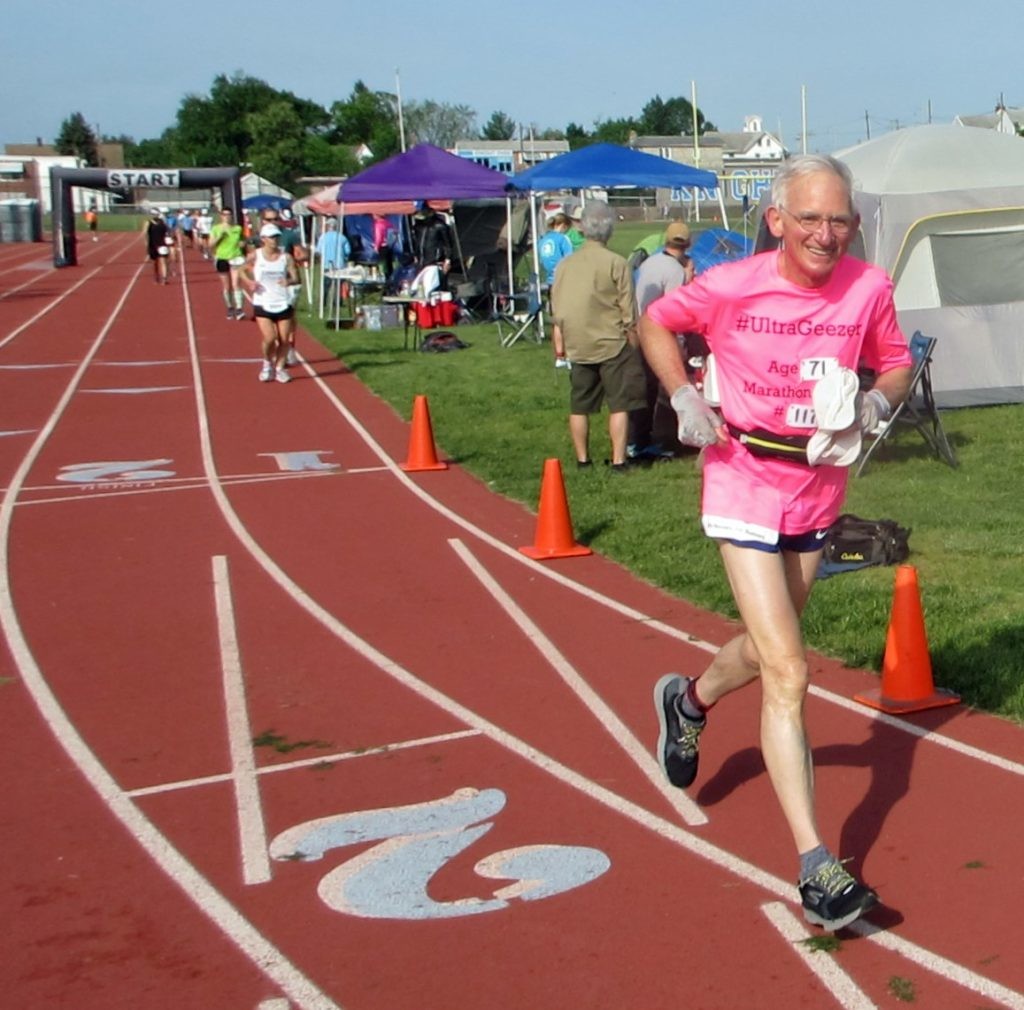
Dykes ran 100 miles in 21:06:07 and 111.79 miles (179.98K) over 24 hours. Records are ratified by the American Ultrarunning Association, though Dykes’ latest records have not been updated on the site. The previous records were both held by Edson Sower, 72, of Arizona, at 22:01:34 and 172.80K.
However, if you take a look, you’ll see that Dykes already holds the US age-group records in the 50K, 50-mile, 12-hour, and 100K categories. He set those last year at the same race.
“I am starting a 24-hour race,” Dykes posted on Facebook beforehand. “By 7:03, I will have seen the entire course!”
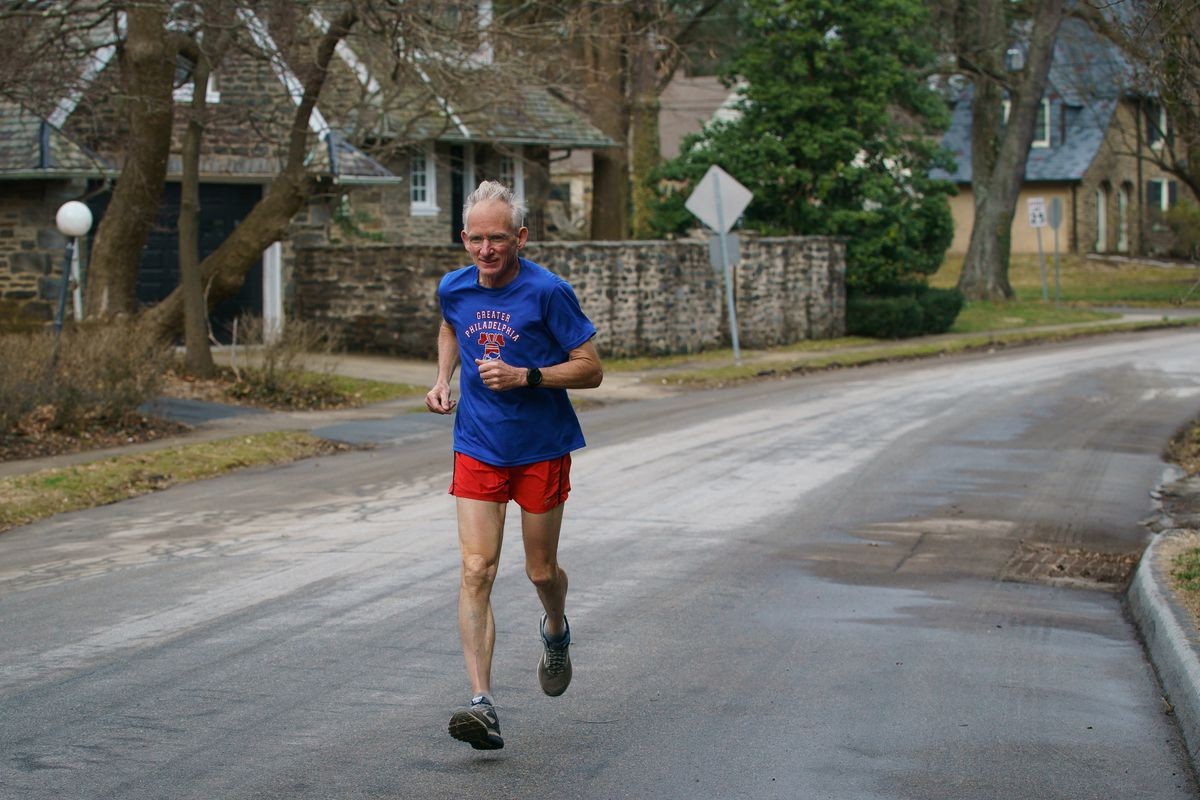
“I really have mixed feelings about fixed-time races,” Dykes goes on, “but the main feeling is, ‘I should really have my head examined!’ …The main reason I occasionally do them… is that I like to get out of my comfort zone now and then, but this race was WAY out of my comfort zone!”
As so often happens at long races, the weather changed drastically over the course of the day, and never conformed to what was forecast. “The forecast was promising–cloudy during the day with a high in the upper 60’s and showers at night–but what we got was something altogether different. Brilliant sunshine all day, and, not being prepared for that, I got some nasty sunburn on my calves.
At night it was cold, rainy, and windy–not the light rain I expected. Fortunately, I brought along a down jacket, which I wore under my raincoat, and heavy wool gloves.”
by Anne Francis
Login to leave a comment
Earl Fee is a canadian phenom, and at 90 he is still setting world records on the track
There must be something in the water in Elstow, Sask., where Earl Fee was born (he was raised in Toronto, where he still lives). The 90-year-old demolished not one but two world masters’ track records on the weekend at the USATF Iowa Open/Masters Championships and All Comers Meet in Grinnell, Iowa. (Another track phenom, Olga Kotelko, was raised not far from Elstow. Kotelko died in 2014 at age 95 with 34 world records to her name.)
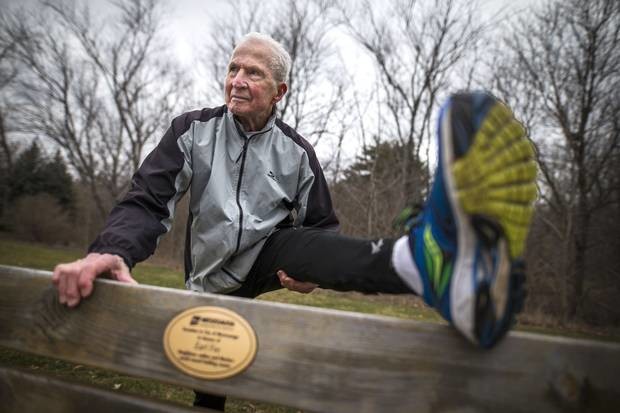
Fee’s time of 1:30.76 in the 400m was 16 seconds faster than the previous record set by Ugo Sansonetti of Italy in 2010, and his 800m performance of 3:42.5 took 34 seconds off Antonio Nacca’s previous record set in 2014.
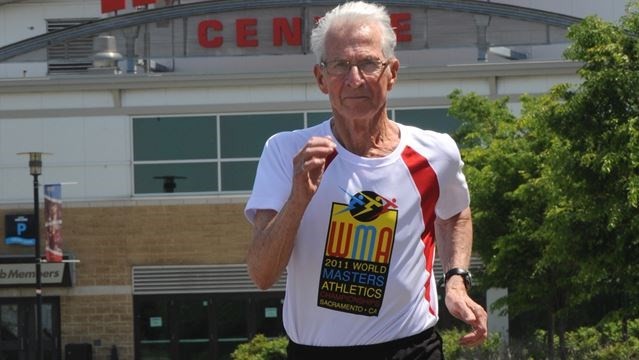
Fee was a decent runner in his school and university days, but left the sport for a number of years, taking it up again in 50s. He soon started breaking age-group records on the track.
Fee still holds the M85 world record in the indoor 400m, and the M70, M75, M80 and M85 records in the indoor 800m, as well as the M75 record in the indoor mile, the M80 record in the 4x400m relay (anchoring a team that included the late Ed Whitlock), and several outdoor age group records.
Login to leave a comment
Gene Dykes has an insane racing schedule for this year from 5k to 218 milles
Gene Dykes, the 70-year-old from Philadelphia whose marathon world record attempt ended in disappointment when he realized the event he chose (the Jacksonville Marathon in Florida) was not USATF-sanctioned has posted his chosen races for 2019 on his Facebook page–all 34 of them. (His 2:54:23 on a certified course is the fastest ever run by someone 70 plus.)
Dykes is as prolific a racer as 2018 Boston Marathon champion Yuki Kawauchi. Here’s what he has lined up for this year: 34 races, consisting of five marathons (including Boston, Big Sur, New York and Philadelphia), 13 ultras (10 of them on the trails, and including no fewer than four 100-milers and a 24-hour track race), and 16 shorter races.
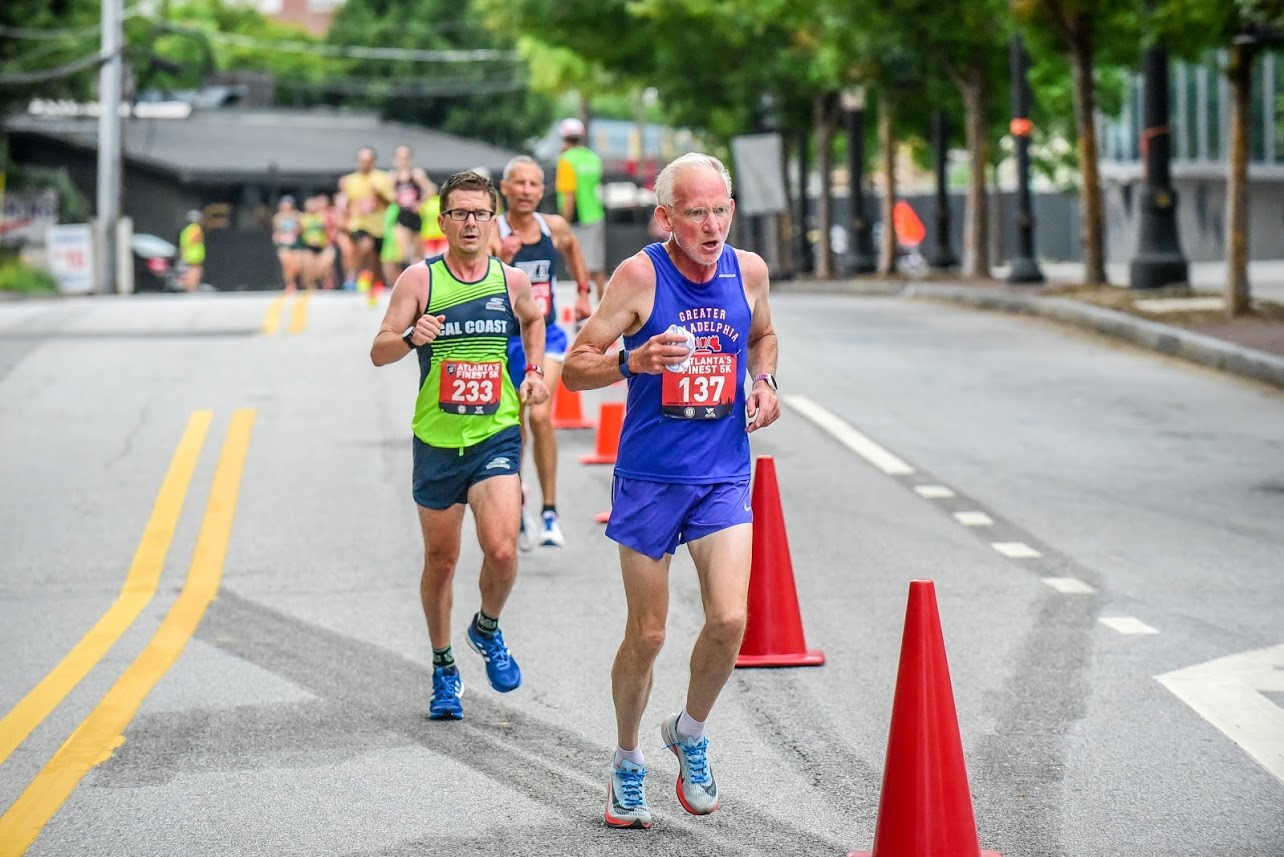
What does not appear on the schedule is another stab at the record he thought he’d bagged in Jacksonville. Though Dykes told us in December that he was planning another attempt at Ed Whitlock’s M70 record at either the Houston Marathon or the Louisiana Marathon (both are January 20), he has now said that’s off, partly because he’s recovering from a fall at the Wild Azalea 50-miler in Louisiana January 5.
Gene wrote on his Strava account, "Trail was particularly treacherous this year. Wet, roots covered in fallen leaves. I went down hard more than a dozen times. I banged up my knee pretty badly at the 30 mile mark but I was able to finish off the next 20 miles.
"I couldn't walk that evening or the next day. Often wondered if I'd ever run again. It's a week later now, and the swelling has mostly subsided."
He did post on Monday that he is feeling just fine now. He was able to run 8.5 miles January 15 at 7:49/mile pace. His next race on his schedule is the Chilly Cheeks 11k trail race January 20.
Login to leave a comment
72-year-old Liang Huguo might be the fastest Marathoner 70 plus in China clocking 3:57
Liang Huguo took up running at age 70. He’s run a sub-4-hour marathon. What’s this Chinese senior’s secret?
He never smoked or drank and did a lot of swimming. He took up cycle racing after retirement, and hiked to Everest base camp
Two years ago, the 72-year-old from Yunnan switched to running, and has since finished 23 marathons. He tells us about his simple diet and training.
He is following an old-school recipe for improving as a runner and leading a full life – a simple diet, no-frills training, travel, and stimulating company.
He has already run a sub-four-hour marathon, dominates in his age group in China, and is enjoying it all immensely.
“I don’t run to just finish. In every marathon I want to beat my PR. If I am far off my personal record I feel really disappointed with myself. I am like this with everything, I want to do everything the best I can,” he explains.
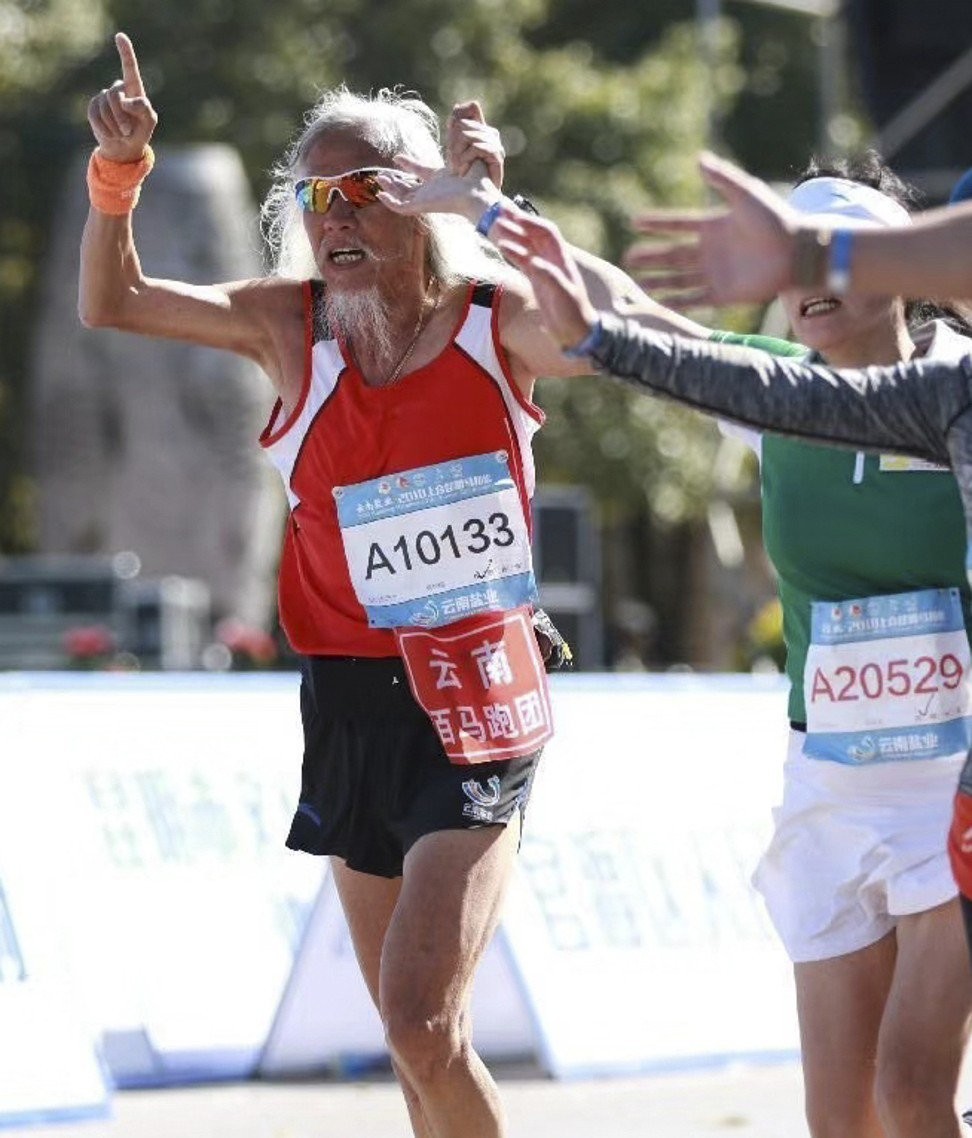
His current PR is three hours and 57 minutes. It qualified him for his age category for the Boston Marathon, and he is going to the United States to take part in it.
“Are you going to run Boston? I cannot speak English, it would be good if we can go together,” he says excitedly.
“We can share a room – you don’t smoke! Whenever I used to go to a race and share a room with Chinese runners, they smoked and they are really noisy. Now I always get a single room just for me. I did this in Berlin this year.”
Liang paid an arm and a leg for a running package tour to the Berlin Marathon, currently Chinese marathoners’ favorite overseas race, but it was worth it, he says.
It was here he set his personal best, and he was left impressed and encouraged by the number of people of his age running.
The official world marathon record in the 70-75 age group stands at two hours, 54 minutes and 48 seconds, set in 2004 by the legendary Ed Whitlock of Canada. Liang is in awe of both the man and the age-group records the late Whitlock set.
“My goal now is to run a 3:30 marathon,” he reveals.
But drawing comparisons between Liang and Whitlock would be unfair. Liang first donned his running shoes at the age of 70, while Whitlock had been an elite cross-country runner in his youth who applied that residual fitness base to train for marathons in his forties.
We will never know what Liang could have done with his talent had he been discovered and received proper coaching as a youngster.
I don’t eat much … I eat mainly vegetables, not much meat.
“I don’t get injured,” he shrugs. “Once my hamstring felt a little tight after a marathon, and it bothered me for a while. Then it just went away.”
He may well be the fastest Chinese runner in his age category, but he says he does not think anyone keeps statistics for that in China. As he is clearly thrilled by the thought of possibly being a national record-holder.
Liang does not get hung up on dietary fads and eats sensibly. “I don’t eat much, but I eat whatever there is. I eat mainly vegetables, not much meat. Every day I drink half a litre of milk, half a litre of yogurt, one egg, one banana and one spoonful of honey,” he explains.
“I try to sleep as much as I can, but now my sleep quality is bad. After five hours I cannot sleep any more. I know this is not good for your health.”
Despite his gregariousness, Liang is a solitary runner. “I run about 80km [50 miles] a week, always on my own, unless I run with my apprentice – she is 47, and has just started running.”
Every weekend he takes a bus for an hour to travel across Kunming to do his long run – at least 20km (12 miles) on the newly laid running paths along Dianchi Lake.
The runners we come across there recognize and greet Liang warmly, including a running couple who happen to work for Yunnan Television.
“They interviewed me recently,” Liang says proudly. “Everyone knows me.”
Login to leave a comment
A new running podcast is going to start up January 10 from Strava
Strava is starting another running podcast beginning January 10. The fitness tracking app is about to unveil a new podcast entitled “Athletes Unfiltered,” for the runners and cyclists who use it.
It will be hosted by The North Face-sponsored ultrarunner Hillary Allen and feature interviews with extraordinary athletes and athletes in extraordinary circumstances.
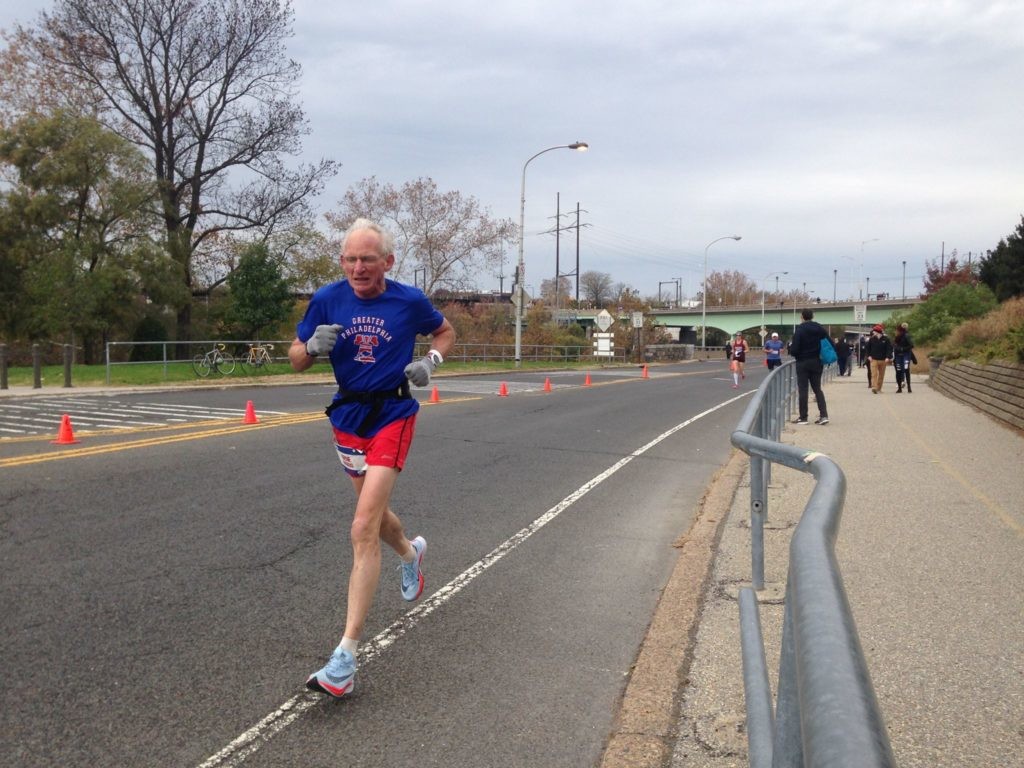
One of the first episodes will feature an interview with Gene Dykes (photo), who recently broke the late Canadian marathoner Ed Whitlock‘s WMA M70 marathon record with his 2:54:23 performance in Jacksonville, Florida.
Strava posted this on their website, “Athletes Unfiltered features normal athletes. They're good, inspiring people, daring enough to share their journey day after day, whether that's breaking a marathon PR or cutting a run short to desperately search for the nearest toilet.”
Login to leave a comment
The marathon that 70-year-old Gene Dykes ran 2:54:23 was not sanctioned by the USATF and his world record will not be accepted
70-year-old Gene Dykes clocked 2:54:23 at the Jackson Marathon but it is not going to be accepted as an official world Record because the race was not sanctioned by the USATF. Gene posted this on Facebook.
“Before running the Jacksonville Marathon, I reached out to the race director for assurance that it was a suitable venue for setting a world record, and I received the response that "you should have a good shot at the record".
“I assumed that he was correct, but I was remiss in not doing my own homework. It appears that, although the Jacksonville Marathon (course) is certified by the USATF, the race was not sanctioned by the USATF, and both must be valid for recognition of records by USATF/IAAF.”
Many races do not pay the fee to be sanctioned by the USATF because they do not see the benefit. The larger races with elite runners have to be sanctioned and they do pay the fee.
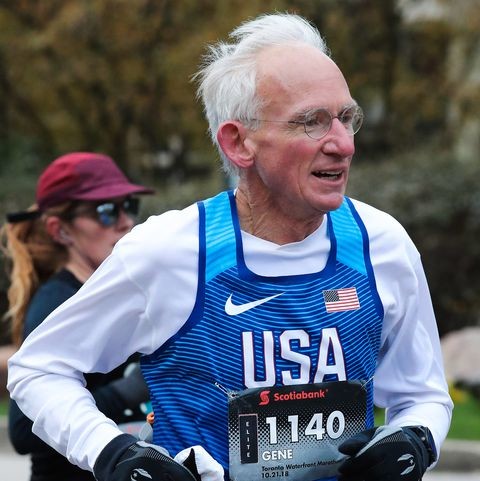
A race of 30,000 plus runners pay $15,300 to the USATF. A smaller race of 3000 pay $1460.
These fees have nothing to do with the course being certified. Most races know the importance of having their course certified. It appears in this case, Jacksonville paid to have their course certified but not the sanctioned fee.
This would have gone completely unnoticed and maybe the race Director did not realize Gene Dykes was going to break Ed Whitlock world record.
But Gene did and now it is not going to be accepted as an official record because this fee was not paid. Maybe in a case like this the fee could not be paid after the fact?
“Gene Dykes deserves the record,” says Bob Anderson “and there should be something that can be done to make this right. If it is just about money, we can pay that.”
Obtaining a USATF sanction involves filling out a sanction agreement to form a relationship between the sanctioned event and USATF. Basically, it means that an event has agreed to follow applicable USATF rules and will be afforded the benefits like insurance and other things as outlined on their site.
Gene continued on FB. “Thank you all so much for the nice things posted about my race. I am still proud of what I've accomplished - it just looks like it's not going to be "official". That said, I still have four more years to do it right, and, who knows, that might happen sooner than you think!”
”Let’s not give up on what you already did Gene. You ran 26.2 miles in 2:54:23 and it should be accepted as the official world record,” says MBR Bob Anderson. “This time is too amazing to ignore.”
by Bob Anderson
Login to leave a comment
Ed Whitlock’s world 70 plus marathon record has been broken by Gene Dykes
Many thought Ed Whitlock’s 2:54:48 Marathon world Record for 70 plus was untouchable until Gene Dykes came on the scene this year.
The 70-year-old Gene Dykes, a retired computer programmer clocked 2:54:23 December 15 in Jacksonville, Florida. This breaks the world record for 70 plus by 25 seconds.
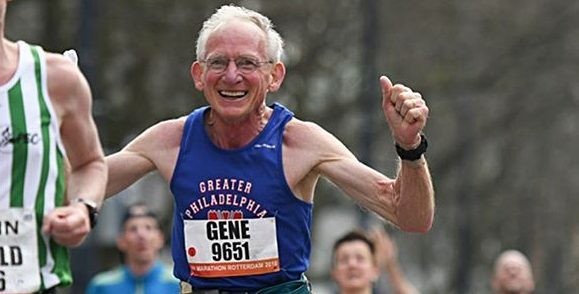
He was over a hour ahead of second place in his division and Gene ran the fastest time for men 55 plus. (Click on the link to read more about Gene in our exclusive two part profile done a couple of months back.)
Gene has only been racing serious a few years now. He had gone under three hours twice already this year and felt he was ready to break the world record by year end.
He decided to hire a coach recently and ever since then Gene has been winning and setting records from 1500m to 200 miles.
Unlike a lot of marathoners he also believes in running races up to 200 miles. Another key element he says is to make sure his weight is just right. It is hard because he loves to eat.
Login to leave a comment
Gene Dykes is getting faster every year - My Best Runs Exclusive Profile Part Two
My Best Runs Exclusive Profile Part Two. Gene Dkyes is only the second man in history over the age of 70 to run a marathon under three hours. He has done it twice. He ran 2:58:28 at the Rotterdam Marathon and then he clocked 2:55:18 in Toronto Oct 21.
Only Ed Whitlock have run faster. Gene Dykes was born in 1948 in Canton, Ohio.
All of his PR's from 200 miles to 1500m (accept for the 5k) have been set in the last year. He has a B.A. in chemistry and a Ph.D. in biochemistry from Cornell University in 1978.
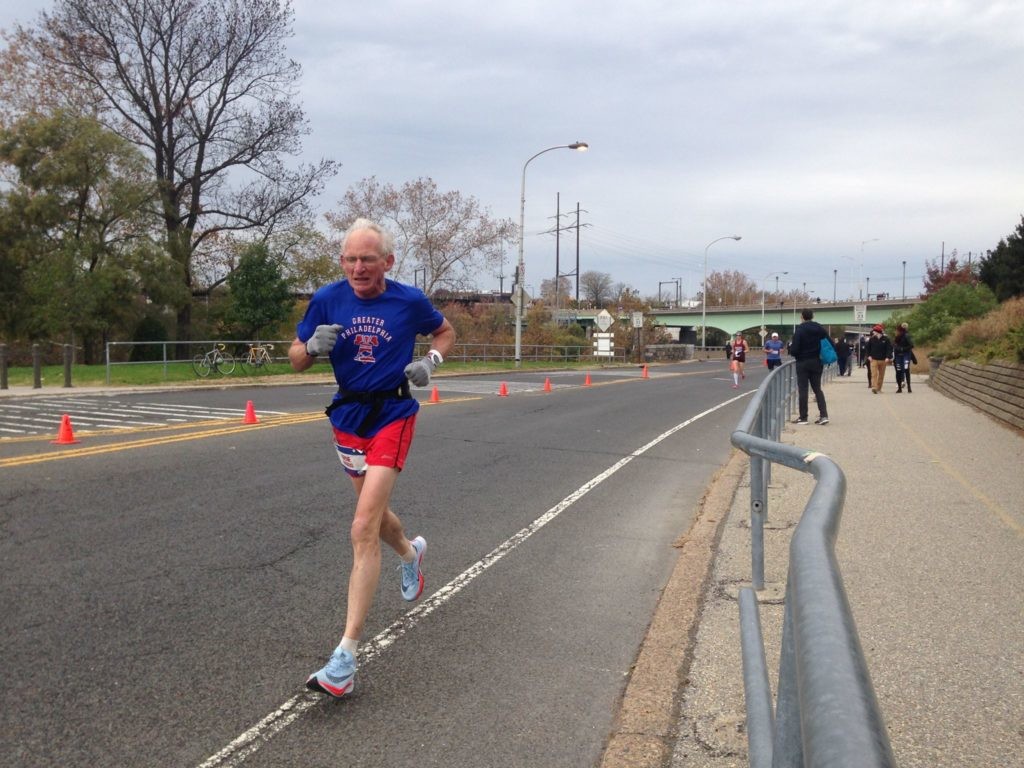
He has been married since 1982 and they both moved to Philadelphia from Ithaca, New York in 1993. After his Toronto Marathon we asked Gene about his race strategy.
"I’m a slave to my GPS watch while running a race," says Gene. "I nearly always run negative splits on any race shorter than a marathon, and I’m rarely more than a minute or two slower in the second half a marathon.
I consume far fewer calories before and during a race than most runners seem to." How about your weight? He thinks the "Two seconds per pound per mile is a rule that is awfully important. Keeping weight down for a major race is the hardest part of training.
It’s especially hard when I use the “See Food” diet. I’ll eat just about anything, especially when I see it."
In 2017 he was only one of 13 to complete the Triple Crown of 200's and he was the oldest finisher in each of them.
In August he ran the 206.5 mile Bigfoot 200, September was the 205.5 mile Tahoe 200 and October was the 238 mile Moab 240. In 2018 he won ten USATF National Championships from 1500m on the track to 100 mile on the trail. So what is ahead for Gene?
"Having turned 70 this year, I decided that I would spend the year chasing records and national championships and forego many of the big ultra races that I really love.
I still have one national age group record to topple which I expect to happen at the Philadelphia Half Marathon in November. Having come up just 34 seconds short of beating Ed Whitlock’s venerable M70 age group record in the marathon, you can be sure that I’m making plans on another attempt within a year.
I’m keeping those plans secret, though," Gene told My Best Runs. In the meantime Gene has signed on to the Run The World Challenge 3 team.
Gene is at the top of the 70 plus world and don't you get the feeling he is going to be setting a lot more records? (Photo taken at the USATF National Outdoor Championships in Spokane)
by Bob Anderson
Login to leave a comment
Gene Dykes is currently the world's top 70 Plus runner - My Best Runs Exclusive Profile Part One
Gene Dykes is the world's best runner in the world currently seventy plus. "One of my 'secret' training methods for marathons is to run a lot of ultras," Gene told My Best Runs in this exclusive profile.
"I’ll begin training for Boston in January, and to kick it off I’ll run a 50-miler in January and both a 100-miler and a 200-miler in February. During March I’ll convert that training base into marathon speed."
Sounds wild and unconventional but it has been working for 70-year-old Gene Dykes from Philadelphia..."It was thought by many of us that Canada's Ed Whitlock's records were way beyond reach," says lifelong runner and Runner's World and My Best Runs founder Bob Anderson.
"At age 73 Ed became the first 70 plus runner in the world to run the marathon under three hours." In 2004 73-year-old Ed Whitlock clocked an amazing 2:54:48 at the Scotiabank Tornonto Waterfront Marathon.
No one ever had run a marathon that fast 70 plus. The late Ed Whitlock was in a league of his own until now. At the same marathon this year on October 21, 70-year-old Gene Dykes clocked 2:55:18.
My Best Runs wanted to find out more about this new super star, a runner who has set PR's at all distances (other than the 5k) over the last year from 1500m to 200 miles. How did Gene discover running?
"It’s probably more accurate to say that I discovered running twice," said Gene. "The first time, when I was about fourteen, it just kind of popped into my head to run three miles to the house of a girl I was interested in. After about a mile and a half, I had to walk for a bit. I was really disgusted with myself, and I swore I would never again resort to walking on a run.
"I actually kept this promise, until I started doing trail races, of course, where there are lots of good reasons to walk now and then."
After this he ran track in high school for a couple of years. "In my senior year I thought I was pretty good when I dominated the 2-mile run in my county. That notion was quickly dispelled when I ran track in college and I was totally blown away by the competition. For the next four decades, I would stay in jogging shape much of the time, but it never occurred to me to race because it had been firmly impressed upon me that I wasn’t a very good runner," Gene remembers.
He rediscovered running in 2004 at the age of 56 after a six year layoff because of a torn hamstring... "A golfing acquaintance told me he had a running group and that I should join him sometime. A classic case of falling in with a bad crowd. They encouraged me to run some races with them, and discovering that I wasn’t half bad, my running career was born," Gene told us.
So how important is running to Gene? "It started out as an activity I looked forward to on weekends, and it slowly took over as my main hobby. Probably starting around 2011 when I ran my first adventure race and started training for Comrades (56-mile race in South Africa) it became way more than just a hobby. While it will never quite reach the point of being 'all-consuming.' I suppose you would be forgiven for thinking that, considering that I’ll have done 38 races in 34 weekends this year."
The obvious next question was, tell us about your training. "For about nine years I just stumbled my way through training. I did lots of long, slow runs with occasional track workouts. I gradually improved, and I was having a lot of fun, but I was worried that my best days were behind me when I fell miserably short of a new marathon PR at the 2013 Toronto Marathon.
"Swallowing my pride and opening my wallet, I hired a coach. What a life changing decision that was! In just five months I went from a half decent runner with modest goals to a runner capable of competing at the highest levels. Training now consists of fewer miles, but harder workouts and fewer rest days," says Gene.
He has set PR's in the last 12 months from 200 miles down to the 1500m. He clocked 98 hours, 10 minutes 22 seconds for 200 miles, 23:41:22 for 100 miles, 1:26:34 for the half marathon and 5:17 for 1500m.
In 2018 he won ten USATF national championships. His 2:57:43 clocked at this year's Rotterdam Marathon was a world single age record until he bettered it in Toronto.
Gene says, "I’m particularly fond of having won championships at both track 1500 meters and trail 100 mile this year.” In part two Gene talks about his diet, going after more records, dealing with injuries and a lot more. Coming tomorrow October 29 on My Best Runs.
by Bob Anderson
Login to leave a comment
70-year-old Gene Dykes has been named USATF Athlete of the Week
Gene Dykes from Bala Cynwyd, Pennsylvania set an American masters 70-74 record in the marathon to earn USATF Athlete of the Week.
Dykes, 70, won the 70-74 age group in the WMA Marathon Championships at the Scotiabank Toronto Marathon, running 2:55:18 to take more than two minutes off his own American record. He was also only 30 seconds off the world 70-74 best, set by Canadian legend Ed Whitlock. Dykes and Whitlock are the only two men over 70 to have broken three hours in the marathon.
Gene wrote this on FB before the race, "On Sunday I will be running the Scotiabank Toronto Waterfront Marathon, and the big goal is to beat one of the most revered marathon records on the books - Ed Whitlock's M70-74 age group record of 2:54:48, which he ran in 2004 at the ripe old age of 73.
If all goes well, it will probably be a nail-biter. I've been training hard for about eight weeks and training has gone well."
Login to leave a comment
Gene Dykes is only the second person 70 plus to run a sub three hour marathon
Login to leave a comment


